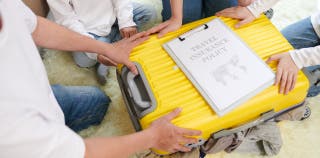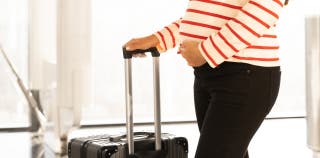

Financial Support Considerations After Stroke
No-one budgets for an injury or illness in life. But when it happens, we need to find a way through.
More and more working age Australians are experiencing strokes, so considering the impact such an unexpected event might have on you or your family is important.
For some people not being able to work can be significant. In addition to the financial challenges this presents, stroke can change a person’s physical ability to carry out their job, it can alter their friendships, and create a sense of isolation.
For some the overall sense of purpose and contribution can shift post-stroke. There is often a period of adjustment, however the sense of purpose and contribution becomes different – not better, not worse, just different.
A common theme is that day-to-day expenses are likely to continue and, together with additional costs for medical treatment and equipment, these begin to cause financial worry and stress.
Some of the financial stress can be reduced via a personal insurance claim, however awareness of personal insurance is low. Industry research highlights that at least 40% of survey respondents aged 18-64 years are not aware they have personal insurance either inside, or outside, of superannuation. Personal insurance is intended to provide financial security to individuals and their families when they are injured or ill. A basic level of personal insurance may often be linked to a superannuation fund. Alternatively, personal insurance may also have been purchased directly.
Personal insurance is different and separate from private health insurance.
Personal insurance such as income protection can replace up to 75% of income if the policy holder is unable to work due to an injury or illness – such as stroke.
Options for assistance with your personal insurance claim
Before starting the personal insurance claim process, it may be helpful to review the ASIC MoneySmart website’s section about making an insurance claim.
Options of personal insurance claim assistance include:
- The insurer — contact them directly
- Your financial adviser / accountant
- The superannuation fund — contact your fund directly
- Financial Rights Legal Centre
- A personal insurance claims advocate service — specialising in claims advice and assistance
Specialist advice
For survivors of stroke who choose to explore their own personal insurance claim, there may be some considerations that are relevant:
Ask the insurer to provide the insurance policy document which was applicable when the policy was purchased, to ascertain the policy definitions that applied at that time. relevant insurance cover was in place at the time. This may also be helpful if a current superannuation statement reads “nil cover” as there may have been cover at the time of stopping working.
Some superannuation funds have a default insurance cover. This may include income protection (replacing 75% of income if you are unable to work) and/or Total or Permanent Disability (TPD) cover. TPD pays a lump sum benefit to those who will never return to work, to help with rehabilitation and living costs.
For survivors of stroke who are only able to resume working part time, a partial income protection claim may apply. For partial claims, an employer pays some income, and the insurer tops up to a maximum of 75% of the pre-stroke income amount.
Personal insurance can be paid even if payments from injury compensation schemes such as Traffic Accident Compensation or Workers Compensation, are already being received, or if the survivor of stroke is a National Disability Insurance Scheme (NDIS) participant.
Finally, while more than half of personal insurance clients believe their insurer may not pay their personal insurance claim, over 95% of correctly lodged claims are paid.
With thanks to AFRM Claims Advocacy , Personal Insurance Claim Advocate Service and Supporting Sponsor of the 2022 Stroke Awards , for providing the information for this article.

- Search Search
- Make accessible Accessibility
- Contact us Contact
- Donate Donate
- Ask a health professional
- Support Groups
- Strokesaurus
Where am I?
- EnableMe Podcast Series
- Read this page to me
Episode 19, 8 March 2019
People often say it’s the journey that matters, not the destination. But although both can be a challenge when you’ve had a stroke, travel is still an important goal for many stroke survivors.
In this podcast, we talk about issues like knowing when it’s safe to fly, finding accessible destinations and transport, making sure you have assistance if you need it, and getting travel insurance.
Our guests are rehabilitation physician Associate Professor Steven Faux; stroke survivor and frequent traveller Kevin English; and occupational therapist Simone Russell from StrokeLine.
This podcast is supported by AllClear Travel Insurance.
Podcast transcript
Announcer: Welcome to the EnableMe podcast series, where we bring together stroke survivors, health professionals and researchers, providing you with practical advice to enable you on your journey to reclaim your life after stroke. The advice given in this podcast is general in nature and you should discuss your own personal needs and circumstances with your health care professionals. You can join the conversation at enableme.org.au . This series is presented by Australia's Stroke Foundation, working to prevent, treat and beat stroke.
Chris: [00:44] Welcome to the first episode of the EnableMe podcast series for 2019. This special episode about travelling after stroke is supported by AllClear Travel Insurance.
People often say it's the journey that matters, not the destination. But when you've had a stroke, both the journey and the destination can be a challenge. Even so, travelling is still a fulfilling and important goal for many stroke survivors.
In this podcast, we're going to talk about how to navigate travelling after stroke. We'll speak to rehabilitation physician Steven Faux, and to occupational therapist Simone Russell.
But first we have with us stroke survivor Kevin English. Kevin is an electrical engineer who had a hemorrhagic stroke nine years ago while he was working in Singapore. He is now a passionate advocate for rapid stroke treatment and he is a Stroke Safe ambassador and member of the Stroke Foundation's Consumer Council. Welcome to the podcast, Kevin.
Kevin: [01:35] Thank you. I was actually living in Singapore for about three years and working on large telecommunication projects right around Asia. And I just happened this day to be working from home, which was quite unusual, and suffered an extraordinary headache. And my wife found me in bed and wondered what the heck was going on, and eventually rang our doctor. And she said to take me to hospital, so they got an ambulance and took me to hospital. And they said I had a subarachnoid haemorrhage, which is a haemorrhage, an aneurysm, in my brain that had burst.
And they operated the next day, which put me into ICU for about two or three weeks in Singapore. And then after about four weeks I got a plane back to Melbourne, which was quite an interesting experience, because I had to go first class with a doctor and a nurse. And fortunately my employer over in Singapore agreed to pay for the cost of that, otherwise it would have been quite substantial. And so I got back to Melbourne. I had two weeks in Epworth Hospital, then about another five months in Caulfield Rehab Hospital.
So during that time I basically learnt to walk, because I was initially completely paralysed down my left side. But fortunately by the time I left rehab, I could walk and I could drive a car, I could go up and down stairs. So it was the basic things I needed to do get on with my life. So since then, it brought my career to an end. I haven't worked since then but, as Chris said, I've been heavily involved in the Stroke Foundation since then and various other activities. So my time is still pretty busy. Just not getting paid for anything I do.
Chris: [03:02] Fair enough. Now, I still want to ask you about the travel you did there, when you were coming back from Singapore, back to Australia. Because that must have been quite frightening to be travelling so soon after your stroke. Was there a lot of worry that it would be dangerous? Or was the fact that you had that medical support, did that make it okay?
Kevin: Well, the medical support certainly helped. I think it was overkill, but just before I travelled they did actually do some more scans and decided I had some more blood on my brain. So they actually postponed it for a couple of days until they could retest that, but it turned out to be nothing. But to come back first class, I was a bit peeved. It's the only time I went first class. I wasn't allowed to drink any alcohol. So I got on the plane and basically it was a fairly comfortable trip back. And then I was put on in a wheelchair and then taken off in a wheelchair, and put straight into an ambulance and taken to Epworth Hospital. So it was a quite straightforward process. It was probably more traumatic for my wife than it was for me.
Chris: [03:56] Okay. Well, I'm hoping you've had a few more travel experiences since then, a bit more pleasant even if they're not in first class.
Kevin: Yes.
Chris: When did you next travel?
Kevin: I travelled, the next time was about 12 months later. Which was quite interesting because I booked it when I basically couldn't walk. So some good friends of ours decided they'd do a boat trip from Budapest to Amsterdam. And so they said, "Well, you think you've recovered enough. Look, we'll book it. If you can't walk you can sit on the boat and admire the things going past, and we'll see how we go." But fortunately by the time I went on that trip, about 12 months later, I could walk and I could do most of the trips off the boat. And certainly I had a very great time. And we decided at that stage that so many things can change where you can't travel, we wanted to take advantage of that and so basically we've done at least one major trip every year since. So I've done a lot of travel in the last nine years.
Chris: [04:45] Okay. What are some of the highlights of that subsequent travel?
Kevin: Last year we went to Africa. That was a real highlight. We really enjoyed going to South Africa and Kenya. South America was great. We enjoyed Canada. Going to the Galapagos Islands and that area we thought was really good when we went to South America. And we've done a lot of travel around Europe. And when we were living in Singapore, we did a lot of travel around Asia as well. So we actually managed to fit a fair bit of travel into the last decade or so.
Chris: [05:16] Well, what do you find are some of the biggest challenges with travelling after a stroke?
Kevin: Well, we've planned a lot of travels. I think one of the first things is deciding whether you're going to book it yourself or whether you're going to go on an organised tour. And there's certainly advantages either way. I mean, a lot of people find that booking it themselves, it gives them a much more flexible itinerary. But it means you do have to carry your own luggage and things like that, and organise your own transfers, from fly-ins back to hotels and things like that. Whereas if you go with an organised tour, there are a lot of advantages if after a stroke. It's a little less flexibility but usually a well organised tour has a lot of interesting things included in it.
And usually your luggage, you can deposit your luggage and they take care of all your luggage. Pick it up from the hotel and put it into the bus and give it back to you at the end of the day. And all the transfers and things like that from planes to hotels, they're all organised. So that takes a lot of the hassle out of that. And I think also I found particularly useful, there's a tour director on most of these trips and so you can ask them about what things they think you're capable of doing or not.
So we found in most cases that initially they'd said, "Oh, I think there's a lot of things you can't do." But usually after a few days of seeing what I can do, they decide I can tackle most of it. So most of the trips, I take their advice if they say something's not appropriate. But I've probably done at least 80% of each of the trips we've done.
Chris: [06:37] Okay, brilliant. Now, one of the things that people sometimes ask about is getting travel insurance and how it can be difficult when you have a condition like stroke. And it can also, yeah, it can be, even though it's important to have. How do you go about getting travel insurance?
Kevin: Certainly I think people say if you can't afford travel insurance you can't afford overseas travel. I'd certainly agree with that. But if you have some sort of a medical problem overseas and you haven't got insurance, it can be just absolutely exorbitant. So I think travel insurance is essential. Initially when I got travel insurance, they wouldn't cover me for stroke. And initially they charged quite a lot of extra money to get the travel insurance. Now, a few years down the track, they don't charge any more, but I'm still not covered for a stroke.
But in my case I have scans every couple of years, so the chances of having the same thing happen again are very remote. So that's really not too much of an issue. But yeah, certainly it's very important to have travel insurance. I think it's very important to look around and find out the appropriate travel insurance, because a lot of travel insurance companies won't cover you for preexisting ailments. So you need to discuss that in detail and make sure you really are covered for what you need. Because you need adequate medical insurance that can bring you back to Australia if you need it and cover your costs over there. So there's quite a lot involved in it.
Chris: Okay, and have you had to use it?
Kevin: No, fortunately we haven't had to use it. We've always taken it. It's cost us a fortune over the years, but it's just one of those essential costs.
Chris: [08:05] So what advice then, additional advice, would you have for other stroke survivors who are looking at travelling after a stroke?
Kevin: Oh, I think there's a lot of things. Things like passport. I mean, any travel overseas you need to make sure your passport has at least six months on it. So you need to check that fairly early on. I'd suggest going to see your doctor at least six weeks before you travel. It's very important to get injections for wherever you're going to, so discuss exactly where you're going. You can go to a medical expert in overseas travel injections. But also get properly checked out and get their advice of what they think you're capable of doing and not capable of doing.
Another thing, I think, is money. You need to take at least one or two credit cards and possibly cash cards through Qantas or somebody like that, where you can load up in other currencies and that can cover your costs. And take some foreign currency with you because, particularly when you first arrive, you may need some foreign currency before you can get to a bank or somewhere like that to get any more money.
I think another important thing is, this is a very good website, smartraveller.gov.au . And you can go on that site and it's got a lot of information about travelling under all sorts of circumstances, including travelling with disabilities. You can also register exactly where you're going. I think that's quite valuable, where you can say, now, this is where I'm going to be each day of your trip. So if something happens and they need to contact you in a hurry, they know where to start if you're overseas. And they also issue warnings, so if you're going to a country like, for example, China they might have warnings about places that they don't recommend you go to. Well, then they'll put those advices out and you can pick those up anywhere in the world and get up-to-date information on what's safe and what's not.
So another one is I think important is advise your bank of your travel plans. Because we've had that experience of going to Malaysia and trying to use our credit card, and finding it was blocked because we made another purchase a little bit before. So if you advise your bank where you're going, where you're travelling to, they'll be a bit more lenient in terms of blocking your credit card if you put a transaction on it.
I think also check out the hotels that you're going to go to. I mean, a lot of hotels around Europe and places like that don't have lifts, so using stairs. Often the bathrooms are not what we're used to in Australia. They often say they've got disabled bathrooms, but often their idea of a disabled bathroom is not particularly suitable for a disabled person. So ask about that at the places you're going to and make sure it suits your particular needs. Particularly if you're going to places like China, their idea of toilets is quite different to our idea of toilets.
Another one I had a few interesting experiences on was getting in and out of swimming pools. Getting in was easy enough. Getting out was the issue. So a couple of times I got in and had to get help from somebody there to help get me out of the pool. And the other places like Galapagos Islands, places like that, so a couple of times I got into a little boat and it was quite an issue to try and get me out of it. So I think over the years I've learnt to make sure, wherever I go, I know how I'm going to get back out of that situation again. And just be mindful that there's some things that you probably can't do as well as you used to be able to do. But overall, with a bit of forethought, you can do most things that you thought you could do.
Chris: Well, thank you very much, Kevin. There's some excellent advice there. And, look, we hope you also keep up the good work of speaking up for other stroke survivors as well.
Kevin: Yeah, I certainly will.
Chris: Thank you. That was stroke survivor Kevin English.
Announcer: [11:42] If you're a family member or friend of someone that has had a stroke, you know that it's just the start of a long journey to reclaim their life. As one of Australia's biggest killers and the leading cause of adult disability, we still have a long way to go until we can say we have beaten it. At the Stroke Foundation, we draw our inspiration from the determination and persistence of stroke survivors, and that's why we work every day to prevent, treat and beat stroke.
There are many ways you can join us to fight stroke, including volunteering your time, telling your story for us to share with the media, speaking up and approaching your local member of parliament with our advocacy team, getting your workplace or community group behind an event like National Stroke Week or Stride4Stroke. Running a fundraiser, donating or leaving a lasting gift in your will, or just by sharing the FAST message with the people around you, so all Australians will know how to recognise a stroke and act fast. Join the Fight Stroke team. Find out more at strokefoundation.org.au .
Chris: [12:41] Next on the line we have associate professor Steven Faux. Steven is the director of the Sacred Heart Rehabilitation and Saint Vincent's Pain Service, Darlinghurst, and he's Associate Professor in Clinical Medicine at the University of New South Wales. Thanks for joining us, Steven.
Steven: Thanks, Chris.
Chris: Now, you're a rehabilitation physician, I believe. For those who aren't familiar with the term, could you please tell us what a rehabilitation physician does?
Steven: Well, a rehabilitation physician is the medical leader of a team of allied health therapists, doctors and nurses, who focus on improving your ability to return to work and normal functioning after a stroke. It's not just a stroke, it can be all sorts of disabilities, but for those who've had a stroke the rehab physician helps coordinate the dietitian and to make sure that you eat properly. They coordinate the physiotherapist to make sure you train and exercise well to try and regain your walking.
The occupational therapist makes sure that you return to work, or return to looking after yourself. The psychologist to manage your mood, the social worker to get your finances into check. Essentially, it's like being the coach of a team with the stroke person being an elite athlete and everyone working to get them to peak performance.
Chris: [14:06] Now, when we're talking about peak performance, I imagine one of the things that people want to perform at is getting back to their normal life, which includes things like travel. How often do people have travel as one of their goals for their rehabilitation?
Steven: Well, in my experience it's fairly common, because stroke occurs at all ages, but for many people it occurs at a time when they're planning to take long holidays or they've been saving up to go overseas or something like that, or to travel around Australia. And so people are very focused on returning to that dream, particularly when that's one of the things they're worried that they may not be able to achieve again. So it's not uncommon that people ask me about, will I be able to travel to Victoria next for a wedding or whatever.
Chris: [15:01] Okay. Now that, I guess, cuts to one of the big questions that we wanted to ask, which is the guidelines or when can people actually travel after a stroke? For starters, I suppose, flying. Is there any sort of rule of thumb about when people can fly after a stroke?
Steven: Yeah, well, it's interesting you say that. There's no evidence for it. There's always been a rule of thumb that says six weeks, but there's no proof that that's the right time or not. There is, however, a bit of an issue for anyone who's had brain surgery as a way of managing their stroke. If you've had brain surgery, then air has been allowed to go inside your skull. And if that's the case, you can't fly until a CT scan of your brain shows that the air has dissipated. And that happens to be around about six weeks. And that's important because of the pressure differences in the flight cabin. That doesn't stop people who've had brain surgery from travelling by road or sea or train, but it does prevent air travel.
One of the main issues I have with people travelling after a stroke are, so long as they're able to get themselves on and off the flight and to and from the toilet on the flight, and they're not going to have trouble boarding or getting off the flight carrying their luggage, etc., there shouldn't be too many problems with travelling after a stroke.
Chris: [16:34] Okay, so that functional ability, is that the kind of thing that people need to consider before travelling?
Steven: Yeah, I think so. I mean, quite often you've got to think about how you're going to get your luggage to the airport and who's going to carry it and how you're going to get it off the carousel. The airlines will often help you, but that doesn't apply to rail or car travel. And then, of course, the other thing is airports have got very long distances for people to have to walk, both in Australia and overseas. And so you have to be mindful of whether you're able to walk for sometimes up to seven or eight minutes. Happily, with enough warning, airlines and airports will provide transport to people who've suffered strokes so that their walking is kept to a minimum.
Chris: [17:32] Okay, now in terms of issues with flying, one thing that a lot of people might be concerned about is deep vein thrombosis, or DVT. Is that something that's a particular issue for stroke survivors, and is there something that people can do about that?
Steven: Well, for some stroke survivors there's not as much of an issue because they're already on a blood thinner, or so they should be. And for many people who've had atrial fibrillation after their stroke, they're on anticoagulants, like the novel anticoagulants or warfarin. So for those people it shouldn't be a problem. For people who've had a brain haemorrhage where you don't usually go onto a blood thinner, you do have to pay a bit of attention to moving your feet around to try and prevent clots.
Now, for those who've got a hemiparesis or an inability to move an ankle on one side, there is a slight increased risk of getting a clot in the leg while flying. Now, in the first few weeks of the stroke when there's a lot of inability to move the limb, it's probably more of a risk than it is later on as the patient responds to rehabilitation and they're able to move their legs around.
For those who aren't on any blood thinners because they've had a haemorrhage into the brain, they might need to wait until it's safe for them to use anti-platelet agents. And when they're able to use anti-platelet agents it's probably wise to take an aspirin before flying just to ensure the risk of the clot in the leg is less. Ideally, people should move their legs around and move around the plane if they can. Or the train or, of course, on a boat. And that mitigates against or prevents the clots from forming.
Chris: [19:45] Now, I guess from what you said there about, particularly people who've had a bleed may not be able to take blood thinners, is it the kind of thing that for anyone who's had a stroke they should speak to their doctor before they commence a large trip?
Steven: Yeah, I think it's something that you should be discussing with the rehab physician or the general practitioner or the neurologist. Particularly if you've had a bleed into the brain. But more so the other issue is if the stroke has affected your ability to move one side of your body, then you really need to think about keeping active during the flight or on the train. And definitely speaking to your GP or neurologist or rehab physician.
Chris: [20:33] Okay. Now, we did put a call out for questions for this podcast from our stroke survivor community. Now, there's one from Bronwyn that is rather specific but touched on some good points, so I'm going to read most of it out pretty much straight. She says that we all know the first four hours after a stroke are critical. She's going on a cruise, so what she wants to know is would her GP prescribe a clot-buster for her to carry in an emergency, or do cruise lines like Royal Caribbean carry such drugs in case of an emergency? Or is there anything she can do, including taking additional blood thinners, to prevent a stroke?
Steven: Well, that is a great question. That is a great question because one of the things it implies is if you're at sea and you have another stroke, would you have access to emergency treatment? The emergency treatment of the clot-busting drugs are intravenous, so they're not oral. Although we do in some cases use a whole aspirin, and that would definitely be available on a boat, and shouldn't be taken unless you've spoken to the doctor. And most boats, particularly those large cruise liners, will have a medical clinic.
Unfortunately, the ability to use clot-busting drugs is not something that should be available to the individual, but rather through the medical clinic. And in the modern age, the medical clinic might be able to have access to telehealth, to neurologists in one of the closer countries to wherever they are travelling. But the problem is most clinics in large ships won't have a brain scanner, and you'll need to have a brain scan before any decision about a clot-busting drug can be given. So great idea, but the technicalities make it sort of not possible. Having said that, if you do have a recurrent stroke, seeing the doctor and getting the doctor to make calls and tele-calls to neurologists or emergency physicians is probably a very good idea in the early phases, in the first few hours of a stroke.
Chris: [22:49] All right, fantastic. Now, do you have any other advice that you might give for stroke survivors or their carers about travelling after a stroke?
Steven: Yeah. The first thing is, I'd encourage it. I'd say, look, if you've had a stroke it's pretty devastating and you fear that you're going to lose all your dreams and hopes. So if you've had a dream to travel, don't give up on it. You may not travel exactly the same way as you had dreamed, but you can travel. And rehabilitation physicians are particularly good at helping people travel. And there are a lot of resources out there for helping people with mild or moderate disabilities travel.
So my advice is absolutely do not give up on your dream of travelling with a disability. And following a stroke, if you had always dreamed that you were going to travel, I would be doing it. So it is a legitimate thing to discuss with the rehab physician or the GP, and if you go onto any website and look at disability and travelling you'll find a myriad of places that will tell you hotels with really good facilities, if you need bigger bathrooms. They'll tell you airlines that are particularly good at getting you on and off planes with attendants. And I'd say travel, if that's your passion, get back to it. As a rehab physician, nothing pleases me more than to have patients come back and say, I eventually did take that trip.
Chris: Thank you, Steve. That's a very positive message.
Steven: Thank you very much. And thanks for inviting me on on your podcast, Chris.
Chris: Our pleasure. That was associate professor Steven Faux.
Announcer: [24:31] Setting goals is crucial to stroke recovery. Goals can be as simple as walking to the letterbox to check the mail, or bigger goals like getting back to work. EnableMe has a unique tool where you and your carer or family can plan what you want to achieve, track how you are progressing and celebrate your successes. You can also connect with other people who set goals similar to yours, and challenge or inspire each other. You can even set up a blog to write down how you are feeling and share your own story. And don't forget, our professionals from StrokeLine can help with personalised and confidential advice to help you grow stronger after stroke. Visit enableme.org.au .
Chris: [25:11] Now, our final guest is one of our regular StrokeLine representatives, occupational therapist Simone Russell. Thanks for coming in, Simone.
Simone: My pleasure, Chris.
Chris: Now, I imagine that on StrokeLine you've heard a lot about stroke survivors wanting to travel. What are the main concerns that you hear?
Simone: We do get enquiries around travel and they vary, really. Sometimes we get people calling us when they've had a stroke overseas while travelling. So I think Kevin touched on his experience personally, and that's a common one that we do get. You know, how do I get home? What sorts of things do I need to consider? It's usually from a loved one or a carer that might be with their loved one who's had the stroke.
And so those are the first calls we get quite a lot of. And then we also get calls around more longer term, people wanting to get back to travel. And even in the short term phase, someone might've had a stroke that had a holiday booked and they want to perhaps talk through whether that's possible, whether it's best to put that travel off or postpone it for a period of time. So it definitely does come up. Sometimes people call us as well to find out about whether they can fly. That's a really common enquiry that we get, and I think Doctor Faux has touched on that quite nicely around some of the considerations for flying.
Other things too that can come up is that fear of having another stroke. And so if someone does decide they want to go travelling, what to consider if there's that fear or anxiety there about having another stroke, or another medical emergency while away. We get lots of enquiries around travel insurance as well. What do I do, where do I start? How do I go about getting adequate cover? Also enquiries even around local travel, so things like, I've returned to driving but someone might have significant fatigue and so they might call us to talk about fatigue as an issue for driving longer distances and wanting to troubleshoot that. And accommodation enquiries as well are quite common, and equipment enquiries. So what sorts of accommodation can I explore in terms of travel either in Australia or overseas, and also equipment, and where they might be able to access that to enable travel.
Chris: [27:07] Okay, I'm probably going to get you to follow up most of those, because you went through quite a few issues there. Now, I guess, as you said, we've spoken to Steven Faux at least about flying after a stroke. When we're talking about things like having a stroke overseas or medical emergencies this is, I suppose, where the travel insurance nicely mixes into that because having travel insurance is a kind of protection there. But it is also a challenge. How do you get travel insurance after you've had a stroke?
Simone: Yeah, it's a really good question. I think Kevin's touched on this one as well. I think usually inquiring with a range of different insurers is a good starting point. Finding out what, I guess, the best options might be for your particular needs. So where you'd want to travel, what you need to be covered? I think Kevin really touched on, if you can't afford the travel insurance then can you actually afford to be travelling? I think it's really an essential part of travel.
I think, too, coming online to EnableMe is a great place as well to start. So there's lots of conversations around other stroke survivors, different experience of finding travel insurance that's appropriate. But in some cases the preexisting condition might not be covered, and so it's checking in, is it covered, is it not covered? There might be differences in premiums, depending on what cover you get. But I always say it's similar to, I guess, anyone that's wanting to travel. Phoning around, getting different quotes and really making sure that you feel well-informed and you know exactly what you're covered for, and what's not going to be covered if there are any exclusions.
Chris: Yeah. And I guess, as you said, you can go onto EnableMe and you can see other people's stories. But your situation might be different and you can't take their costs or requirements.
Simone: Absolutely. It really is a case-by-case. Everyone's stroke is different, everyone's medical history is different as well. And so insurers may want to know more information that's really specific to your particular medical history and stroke.
Chris: [28:58] Okay. Now, next on the list, accessible accommodation. How do you go about finding accessible accommodation?
Simone: Yeah. Well, I'm going to go back to Kevin's comment around, do you decide to self-book or do you go through a travel agent or even a travel agent that may specialise in tours or even disability travel? I think if you're going to self-book, there's a lot of options now online. So going to pretty much any kind of accommodation search function will show you can actually select disability access, and then that gives a lot of options to see what might be available. Particularly if you're looking at a weekend getaway in Australia perhaps, it's very, very easy to see who has accessible accommodation. And then making phone calls to find out exactly what that involves.
I think Kevin touched on, sometimes overseas there, someone's idea of accessible bathrooms, for example, might be very different to what we have here in Australia. So taking that in mind and I think going through a travel agent can be one option to kind of know that they've had experience with that particular hotel or accommodation before. That can be really helpful. You can see often now a lot of photos online, so that can give you a bit more of a kind of idea about what to expect in terms of standards of disability access.
again, using the community. So lots of stroke survivors have experience with travel, finding out if they've got any recommendations. But yeah, generally now there's lots of options online to just see what's out there and to have a look at photos yourself. But definitely, again, having an open conversation if it's a travel agent you're going through or a tour guide company. You know, really finding out what the level of accommodation's going to be like and is that suitable for you? And is any other equipment needed, if that's required to make it safe and enjoyable?
Chris: [30:45] Okay. Now, speaking of equipment, so if you, for instance, do need special aids or support, such as wheelchairs or even a carer to look after you while you're travelling, is that the kind of thing that you can look at hiring at the destination?
Simone: Yeah. Look, you can. I mean, I guess if you're looking at travel in Australia that's much easier to organise equipment ahead of time. If you're doing a self-booked holiday, planning it and it's overseas and you're needing equipment at every different place you're going to, that might be a little bit more challenging to coordinate and to rely on.
So I think again weighing up what it is you need specifically. Even working in rehabilitation, it might be that actually with a little bit of work on, say, transfers for example, that getting on and off a low toilet, it's not as big an issue as it might be originally and you might not need equipment for it, for example, a few months down the track. So you can really look at rehab goals as well, tailoring towards working towards some of those things.
But I think getting a really clear picture about what equipment needs you have. If it's something you can take with you, like a stick, for example, what that might be. If it's a wheelchair, is that something that comes with you from the start to the end of the journey? And what may be better to hire or to arrange at the destination or at the accommodation site. But, yeah, it's not impossible. I think really being aware of what you need and then finding out what the best option is, what's going to be easiest to manage.
Chris: [32:08] So I guess then to sum up, would you be able to give us your top tips for people travelling after stroke?
Simone: I think the first one would be planning ahead. So really doing your research and preparing well. There's a lot of checklists out there that you can use. But the other thing is to think about what you would consider even before a stroke if you were to go on a trip or a holiday. So thinking about all the sorts of things like weather, clothing, equipment as we've touched on, any medication that you might need, making sure that you have enough of a supply of medication as well, that you're not going to run out mid-trip.
The environment, so looking at the accommodation and looking at transportation. So whether that's trains, whether that's planes, whether that's cars, or any other transport you might be using. If it's getting off boats, buses, all of that sort of thing. And really mapping out an itinerary. I think Kevin also touched on using Smartraveller to document where you're going. Even that sort of old, I guess, tip of having an itinerary and leaving it with a loved one so they know where you're at and what you're doing as well.
And it might sound a little bit negative, but thinking about what could go wrong I think can help some people, particularly if there's any fear or anxiety about travelling. So really making sure that you know what the emergency number is in a foreign country, for example, so if there was a medical emergency you know you feel comfortable to get medical help. Knowing perhaps where the nearest hospitals are if you're in major cities, or how you might get help if you are in more rural areas. And even things like knowing basic language for asking for help, those kinds of things can help as well if you're feeling nervous or if there's anticipation around travelling.
Other things like start small. I think we've talked a lot about overseas travel today, but thinking about building up slowly if you're not confident or if perhaps you've not been a confident traveller. So things like, it might be just getting to, say, a family wedding, for example, which might be in Australia. That might be your first step. Or it might be going for a day trip somewhere or going away for a weekend, and then building up to longer trips or even overseas trips. That can be a really good way to just start to get some confidence and experience travelling again after stroke, and problem-solving some of the things that might happen as you go.
Considering all alternatives and being open is a really important point. So I think Doctor Faux touched on this and it's really about, you may not be able to go on that six week overseas trip to start with, but being open to other alternatives. It might be things like a cruise, which you might not have considered before. But it's an easier option to still be able to get out and enjoy travel. Or it might be a tour-operated holiday. Other things we've talked about, the insurance obviously is a really important one which we've covered. Speaking to your doctor we've covered as well. Really making sure that you have a conversation with them and that can be the rehabilitation physician, the GP or the neurologist.
Really asking any questions, writing down your list of questions so that you feel prepared. Speaking to the rehab team I've touched on as well. So if travel's a goal, make it known and start to actively work towards different steps in your goal. And it might be also recruiting family and friends as well, and making sure you've got support. Sometimes carers are needed to facilitate travel, so talking about that with the team. You know, is it possible to have a paid carer go on a trip with you?
Other options and advice I would have is to call us on StrokeLine. Each case is different and we can sort of tailor the advice specifically to you. So give us a call. We can troubleshoot any questions, problem-solve. And EnableMe I've suggested already before, but get online, start some conversations. There's already some fantastic conversations on travel in EnableMe. And people like Kevin are such a wealth of experience and knowledge, and it's really important to communicate with each other and share these tips. I think it's really inspiring to see stroke survivors like Kevin getting out there and travelling, and really showing people what's possible.
So, yeah, I think I'm just going to end by, I guess, echoing Doctor Faux's comments around if this was a goal, if this is a goal, don't think that just because you've had a stroke that you can't travel. You know, keep working on it and go for it.
Chris: [36:08] Great. Thank you very much, Simone. That was occupational therapist Simone Russell. And as Simone said, if you want to speak to a health professional, you can call StrokeLine on 1800 787 653. That's 1800 STROKE. Or you can ask a question through EnableMe and get a response from health professionals and other stroke survivors.
That is all we have time for today. If you like what you've heard, please give us a good rating and review on iTunes or whatever service you're using, as that helps lift us up in the search rankings so other people can find our podcast. Thanks again to our guests, Kevin English, Associate Professor Stephen Faux and Simone Russell.
And thank you to AllClear Travel Insurance for supporting this podcast. If you need specialist travel insurance after a stroke, you can visit our website, strokefoundation.org.au/travel to obtain a quote. Or call 02 9333 3922 and use reference number AST when you speak with an AllClear Travel Insurance representative. With any policy purchased, AllClear will make a contribution of up to 20% of your premium, excluding GST and stamp duty, to the Stroke Foundation to help us continue to support stroke survivors in the community.
Announcer: [37:19] That's all for today's EnableMe podcast. You can find out more on this topic and continue the conversation, or listen to other podcasts in the series, at enableme.org.au . It's free to sign up and you can talk with thousands of other stroke survivors, carers and supporters. You can also suggest a topic or provide feedback on this podcast. EnableMe has qualified health professionals from StrokeLine who can answer your questions and give evidence-based advice. The advice given here is general in nature and you should discuss your own personal needs and circumstances with your health care professionals.
The music in this podcast is Signs by stroke survivor Antonio Iannella and his band The Lion Tamers. It's recorded at Antonio's studio, which you can find out more about at facebook.com/studiofour99 . This EnableMe podcast series is produced by the Stroke Foundation in Australia, working to prevent, treat and beat stroke. See strokefoundation.org.au .
- About enableme
- Terms of use

Stroke Foundation respectfully acknowledges the Traditional Owners and Custodians of Country throughout Australia, whose sovereignty was never ceded, and acknowledges their continuing connection to land, water, sky and community. We pay our respect to the peoples, cultures, and Elders past, present and emerging, for they hold the memories, culture and hope of their peoples.
© 2024 Stroke Foundation ABN 42 006 173 379 - All donations $2 and over are tax deductible

Mon - Fri 9am - 8pm
Sat 9am - 4pm
Sun 10am - 4pm
- 0800 294 2969
- Single Trip Travel Insurance
- Annual Travel Insurance
- Cruise Travel Insurance
- Family Travel Insurance
- Staycations
- Winter Sports
- Coronavirus
- Business Travel Insurance
- School Trip Travel Insurance
- All No Upper Age Limit Travel Insurance >
- Car Insurance
- Home Insurance
- Smart Luggage
- Life Insurance
Specialist Travel Insurance with no upper age limit
- Angioplasty
- Atrial Fibrillation
- Cardiomyopathy
- High Blood Pressure
- Multiple Sclerosis
- Breast Cancer
- Skin Cancer
- Lung Cancer
- Prostate Cancer
- Crohn’s Disease
- Back Problems
- Osteoporosis
- South Africa
- All Africa Insurance >
- All Asia Insurance >
- The Dominican Republic
- All Caribbean Insurance >
- All Central America Insurance >
- All Europe Insurance >
- Puerto Rico
- All North America Insurance >
- New Zealand
- All Oceania Insurance >
- All South America Insurance >
- Get a Quote
- Airport Hotels & Parking
- Travel Advice
- Working with Us
- Medical Advice Hub
- Brand Showcase
- Meet The Team
- Careers: Apprenticeship Scheme
- Amend your policy
- Your Questions Answered
- Make A Complaint
- Making a Claim
Travel Insurance for Strokes
Don’t let the fear of a stroke stop you from travelling. your travel insurance has you covered.
Travel can be a concerning prospect if you have had a stroke, and worrying about whether it will happen again is entirely normal. Strokes are a common medical issue for many people in the UK, with reports of a new case every five minutes .
Travel Insurance for Stroke Survivors
Our specialists have extensive experience assisting customers in their quest for Travel Insurance that can protect them in the event of a stroke or TIA (mini-stroke) while abroad.
Don’t let the fear of a stroke or TIA stop you from enjoying your well-deserved trip! Getting Travel Insurance that covers you for a stroke or TIA will help you prepare for a medical emergency while you’re on holiday.
Finding the Right Policy
We aim to make finding Travel Insurance for a stroke or TIA easy by working with a range of insurers which specialise in covering pre-existing medical conditions , including post-stroke. Get a quote online, or if you prefer to speak with someone, contact one of our Travel Insurance specialists, who can help you over the phone.
When responding to medical screening questions, try to be as honest and accurate as possible. Once we receive your response, we will be able to accurately scan our market, understand the type of Travel Insurance you need for your pre-existing medical condition and try to assist you in finding stroke Travel Insurance.
Enjoy Your Holiday with Peace of Mind
Once you have Travel Insurance that covers you for a stroke or TIA, you’re all set to enjoy your holiday. Whether that be lounging at a pool, exploring jungles, or hitting the ski slopes!
Pre-Travel Tips
There are other precautions you can take before travelling. Alongside making sure you have Travel Insurance that covers you, we recommend that you speak with your doctor if you are unsure whether you are fit to travel. If you need a specific type of medication, make sure it is easily accessible while travelling. Additionally, getting a note from your GP stating that you need that medication to get through security with no unnecessary delays is a good idea.
Travel Insurance for Stroke FAQs
Frequently asked questions about Travel Insurance for Stroke.
Can I get Travel Insurance after I have had a stroke?
Travel Insurance policies are available for hundreds of pre-existing medical conditions, including strokes or TIA. Finding Travel Insurance that covers your specific situation is essential. Our Travel Insurance specialists are experienced in helping customers who have suffered from a stroke or TIA find Travel Insurance that suits them.
Do I need to declare my stroke on my Travel Insurance?
If you do not declare a stroke or TIA with your insurance company, you could risk your Travel Insurance becoming void if a stroke-related medical issue were to occur while you are away. If you do not declare your stroke, you would not be covered if you had a stroke on holiday, but also anything related, such as a heart attack. To be fully prepared, make sure your Travel Insurance covers stroke or TIA.
Is a stroke a pre-existing condition?
A pre-existing medical condition is any illness or injury you had before taking out your Travel Insurance. If you have suffered from a stroke or TIA, this qualifies as a pre-existing medical condition.
Is Travel Insurance expensive after a stroke?
The average cost of Travel Insurance after a stroke or TIA may increase due to the potentially higher risk of needing to make a claim while travelling. However, it will also depend on your age, other medical history, where you’re going and for how long.
It also depends on how long ago your stroke was. As for full strokes, we will ask you if it was more or less than 3 months ago and how many strokes you have had in the last 6 months, which may affect the price.
Securing stroke Travel Insurance is vital as if something were to happen and you did not have adequate cover, you could end up paying out of pocket. We’ll compare prices from several insurers and offer bronze, silver and gold options on most policies. Secure your peace of mind.
Can you fly after a TIA (Transient Ischemic Attack) or Stroke?
Yes, you can generally fly after experiencing a TIA or stroke, but it’s essential to consult with your GP before making travel plans. The timing of your flight post-stroke or TIA will depend on your overall health, the severity of the episode, and any underlying medical conditions that might have contributed to the TIA. Your doctor will assess your situation and may recommend waiting a period before flying to ensure stability and manage any risks. You must declare these conditions as a pre-existing medical condition when securing Travel Insurance.
Do I need to inform my Travel Insurance company after a TIA?
Yes, you must inform your Travel Insurance company if you’ve had a TIA. Declaring a TIA is crucial because it’s considered a pre-existing medical condition. Not disclosing this information could invalidate your policy, leaving you without cover for any stroke-related medical issues while travelling or if you need to cancel your trip due to your condition. If you have already purchased your Travel Insurance and have suffered a TIA since, have spoken to your doctor and are still planning on travelling, you must update your policy. Informing your insurer allows them to provide a policy that accurately reflects your medical history and ensures you have the appropriate cover, should something happen.
Travel Insurance for Strokes – Your Cover
- Cancellation/ curtailment up to £12,500 (£30,000 on referral)
- Missed departure up to £1,500 per person
- Baggage up to £3,000 per person
- Personal Liability up to £2 million per person
- Zero excess policies available
Medical Cover for Strokes
- Emergency medical expenses and repatriation up to £15 million
- 24/7 emergency medical assistance
- Cover for all types of Autoimmune Conditions
We Compare Prices From These Insurers
Click here to download the Policy Wording and Insurance Product Information document for all insurers

Instant Cancellation Cover
Our online quote and medical screening engine enables you to compare and buy Travel Insurance quickly and easily.
Our Latest News

Travel Insurance Checklist – Everything you need to know
Mar 20, 2024 | Blogs
We know that Travel Insurance can be complex especially for those who have pre-existing medical conditions, so we have pulled together our go-to...

Travel Insurance for Kidney Disease
Mar 13, 2024 | Blogs
Travel Insurance for Kidney Disease This March marks World Kidney Day and we're joining in to help raise awareness of kidney disease. We know that...

6 ways to improve your kidney health – World Kidney Day 2024
Mar 13, 2024 | Blogs , News
We are joining in with World Kidney Day 2024 to help raise awareness of kidneys, why they are important and how to improve your kidney health. It’s...
Compare prices in minutes

Copyright © 2023. Just Travel Cover
- Travel Tips Advice
- Compare Travel Insurance
- Pre-Existing Medical Conditions
- Holiday Home Insurance
Customer Services
- Opening Times
Victoria House, Toward Road, Sunderland, SR1 2QF
Call: 0800 294 2969
Monday - Thursday 9am - 6pm, Friday 9am - 5.30pm
Buy with Confidence
Secure Payments
UK Call Centre
Leading Broker
Justtravelcover.com is a trading style of Just Insurance Agents Limited, which is authorised and regulated by the Financial Conduct Authority (FCA) number 610022 for General Insurance Distribution activities. Registered in England. Company No 05399196, Victoria House, Toward Road, Sunderland SR1 2QF. Our services are covered by the Financial Ombudsman Service. If you cannot settle a complaint with us, eligible complainants may be entitled to refer it to the Financial Ombudsman Service for an independent assessment. The FOS Consumer Helpline is on 0800 023 4567 and their address is: Financial Ombudsman Service, Exchange Tower, London E14 9SR. Website: www.financial-ombudsman.org.uk/
Privacy Overview
Stroke Helpline
Monday to Friday: 9 am to 5 pm
Saturday: 10 am to 1 pm
Sunday: Closed
Supporter Relations
Saturday: Closed
- Professionals
Going on holiday after stroke
Holidays are an important part of life, and this guide can help you with holiday planning if you have a health condition or disability after a stroke.
The information on this page can be accessed in other formats:
- Download our PDF and large print Word document Holidays and stroke.
- Order your printed copy from our shop.
- Request a braille copy by emailing [email protected].
On this page:
Can I still go on holiday after a stroke? Types of holiday Flying after a stroke Do I need travel insurance? Travelling with medication
Can I still go on holiday after a stroke?
If you're thinking about getting away, there are various holiday options to choose from with different levels of support.
If a stroke has left you with mobility problems, you may prefer to book with a specialist travel agency that can arrange care and equipment for you. Some holiday packages also include an organised programme of activities, such as sports and outdoor activities or visits to local attractions, while others only offer accommodation so that you can do your own thing.
Coronavirus (COVID-19) and holidays
We know that holidays and travel may be affected by changing social distancing rules for some time. You need to check on the latest rules about your journey and destination before travelling.
If you are more vulnerable due to a health condition, you will need to follow the advice you are given to reduce your risk of infection.
Air travel after a stroke
People often ask whether it is safe to fly after a stroke. There is no hard and fast answer to this. Most airlines will not carry someone within days of a stroke, but the rules vary between airlines and countries.
In the weeks after a stroke you are at the highest risk of another stroke. So the most important thing is to get individual advice from your hospital or GP about the likely risks of travelling.
In the UK, the Civil Aviation Authority suggests waiting 10 days after a stroke before a flight. But if your condition is stable you may be able to fly after three days.
Each airline will have its own rules on flying with medical conditions, so you need to check with the airline before flying. You may be asked to provide a doctor's note or certificate.
Immediately after a stroke, you may need to attend check-ups and have medical treatment. The full effects of a stroke may take time to emerge. You might need help with these effects, and you might need to attend therapy sessions. So it's really important to get medical advice about your own situation before you travel.
If you have a stroke caused by a clot (ischaemic stroke) you will be given medication to reduce the risk of blood clots. This needs to be taken regularly to be effective. So you need to plan carefully before travelling to make sure you have the right medications with you, and that you take them at the right times.
Carry medication in both your hold bag and hand baggage, in case any of your luggage gets lost.
If you have a stroke while on holiday, you might need to take a flight to get back home. If you have medical insurance, your insurance company should give you help and advice on medical treatment and getting back home. You can also contact the local British Consulate, which can offer advice and practical support.
Travel and blood circulation
During a flight, the air pressure inside an aeroplane cabin is lower than it is on the ground. So when you fly, you have a bit less oxygen in your blood than normal. This may affect certain people with a heart problem or breathing condition, so ask your GP if this applies to you.
On a long flight, you are likely to be inactive for a period of time which makes you more likely to develop a deep vein thrombosis (DVT). A DVT is a blood clot in a vein, often in the leg.
The best way to reduce the risk of a DVT on any long journey is to drink plenty of water, and stay active. Simple exercises like flexing your ankles or walking around will improve your blood flow. Do this regularly during the journey.
If you have had a DVT in the past, and you don't take anti-coagulation medication, ask your GP for advice before a long journey.
Some travellers wear compression stockings during a flight. However, you should not wear these if you have peripheral artery disease (PAD). This condition reduces blood flow in your legs, so wearing the stockings can reduce blood flow too much. Ask your GP or pharmacist for individual advice.
Getting around the airport
All European airports should have facilities to help you move through the airport and get on and off the plane if you have reduced mobility. Airline crew are not able to provide personal care, and the airline may insist that you travel with a companion if you are unable to eat, understand safety briefings or reach emergency exits without help.
Most airlines will carry two items of mobility equipment for free. This should be in addition to your baggage allowance. If you have a wheelchair, it will be stored in the hold. You should tell your airline, travel agent or tour operator before you travel if you're taking a battery-powered wheelchair or mobility aid.
Contact the airline to discuss your requirements, and any additional help you will need on the flight, at least 48 hours in advance.
Do I need travel insurance?
It is important to have travel insurance, especially if you are going abroad.
Make sure you declare that you've had a stroke when arranging your insurance and check that you are fully covered. Many policies will exclude conditions that you had before you took out the policy (known as pre-existing medical conditions). This varies between policies, but it could mean that you would have to pay for any costs relating to these conditions. There are specialist travel insurers that provide cover for pre-existing conditions.
Specialist insurance from All Clear
The Stroke Association has a partnership with specialist medical travel insurer AllClear Travel, which provides comprehensive cover to stroke survivors. Find out more at our travel insurance page .
Global Health Insurance Card (GHIC)
The Global Health Insurance Card (GHIC) replaces the European Health Insurance Card (EHIC) for most people. Despite the name, it allows you to receive state-provided healthcare only in European countries. Treatment is at the local cost, or sometimes for free. It will cover your treatment until you return to the UK. It also covers the treatment of pre-existing medical conditions.
It won't cover certain costs, including the cost of returning you to the UK, so you still need to get private travel insurance as well.
How to apply
Visit the Global Health Insurance Card page on Gov.uk for full details of eligibility and a link to the free application page. A GHIC is free of charge. If you are charged a fee while applying online, leave the site, go to the NHS GHIC page .
European emergency number: 112
Dial 112 from anywhere in the UK or Europe to be connected to local emergency services.
Travelling with medication
If you carry medication or medical equipment such as syringes in your hand luggage, you should bring documentation like a doctor's letter. You should also carry a copy of your prescription. As well as helping you avoid any problems at airline security and customs, this will be useful if you need medical help while you're away.
Make sure you take enough medication with you in case you are unexpectedly delayed. If you are travelling across time zones, ask your pharmacist for advice about timing your medication.
It may be possible to take oxygen cylinders on board a plane. You need to contact the airline about this before you book.
Liquid medication
Current rules on liquids in hand luggage say that you can only take containers of up to 100ml. However, you can carry liquid medication of more than 100ml in hand luggage, as long as you have a doctors letter. Airport staff may need to open the containers to screen the liquids at the security point. For more information about this, contact the airline.
Check before you fly
Always contact the airline or travel company if you have any questions about health conditions or support for disabled travellers. There may be restrictions on taking medications into some countries or specific health advice on travel in a particular area.
Check beforehand with the embassy of the country you're travelling to, or check the government's foreign travel advice.
Related pages
Useful links.
- United States
- United Kingdom
Travel insurance for visitors to Australia
You can get travel insurance from an australian provider if you are planning to visit the country. it can cover medical expenses, cancellations, lost luggage and more..
In this guide
Compare policies for visitors to Australia
What is travel insurance for overseas visitors to australia, what does travel insurance for overseas visitors cover, other insurance options for visitors to australia, conditions of non-resident travel insurance for australia, questions about travel insurance for visitors to australia.
Destinations
What you need to know
- If you are coming to Australia, a handful of providers offer inbound travel insurance policies .
- You can take out policies for family members coming to Australia as well.
- Travel insurance can cover things like medical expenses, flight cancellations and personal liability – it is not the same as OVHC.
*When looking for cover, make sure to read any guidelines in the PDS to ensure you qualify for the policy. Most insurers have limitations when it comes to covering pre-existing medical conditions for visitors to Australia. Note: This information was last updated August 2023
Travel insurance for overseas visitors, sometimes called inbound travel insurance, is for non-Australian residents who plan to travel to Australia.
For example, if you are currently in the Phillipines and want cover for when you are in Australia, including the inbound flight, this type of policy can cover you. It can also cover family members – for example, if you're currently living in Australia and want to cover a family member travelling to see you.
Inbound travel insurance is not the same as Overseas Visitor Health Cover . This is a type of health insurance you often need if you are coming to work in Australia on a visa.
Can non-residents get regular travel insurance?
If you don't live in Australia, you will need to get inbound travel insurance – it's a type of policy designed for non-residents. However, if you're a temporary or permanent resident in Australia, you should be able to get regular travel insurance. I was able to do this as temporary resident when I first moved to Australia from Scotland.
Gary Ross Hunter Finder's insurance and innovations editor
Travel insurance for overseas visitors includes similar benefits to international travel insurance policies, such as:
- Medical care. Cover if you need medical care while you're in Australia. Emergencies are often unexpected and expensive, so don't let you or your family get caught out.
- Interruption. Sometimes, unforeseen circumstances force you to cancel or cut your trip short. Whether you lose your job or are diagnosed with an illness, the long journey means that flights to Australia can be pretty expensive. Travel insurance policies reimburse you for the money you are otherwise not able to get back.
- Belongings. You're travelling such a long way so the last thing you want is to be stuck in Australia without your luggage. If your luggage and belongings are lost, stolen or damaged on your trip, your insurance policy will provide cover for the cost of their repair or replacement. Similarly, if an airline misplaces your luggage or it is delayed, cover is available to help you buy essential clothing and toiletries.
- Theft. Australia is a generally safe country but theft can occur anywhere, especially if you're planning on exploring different parts of the country. Travel insurance looks after you if your cash, credit cards, passport or important travel documents are stolen.
- Accidents. If you're planning a road trip, rental vehicle excess cover makes sure you don't have to pay the excess on the rental vehicle if something goes wrong. Travel insurance for visitors to Australia can also include personal liability . If an accident occurs and you are legally liable to pay for the costs, this can reimburse you up to the limit specified on your policy.
- Travel insurance for overseas students
- Inbound travel insurance
- Long term visitors
- Health insurance for Australian visa holders
Typical conditions and eligibilty requirements for non-resident travel insurance include:
- Most of your time must be spent in Australia. You can travel to other destinations for a short time but most of your trip must be spent in Australia.
- Pre-existing conditions. Not all pre-existing medical conditions will be covered by insurers. Some may be automatically excluded and for others, you may be required to submit further information detailing the nature of your condition.
- Age limits. Non-resident travel insurance will generally have an age limit on people who can take out cover. For example, many policies stop offering cover if you are under the age of 80.
Get a free travel insurance quote
Why you can trust Finder's travel insurance experts

We're experts

We're independent

We're here to help
What is the best travel insurance for visitors to australia.
The best travel insurance for visitors to Australia depends on your needs. However, you will probably need inbound travel insurance because this covers non-residents travelling to Australia for a short stay. If you live and reside in Australia – for example, you're on a visa, you should be eligible for any type of travel insurance.
Is it possible to purchase a travel insurance policy once you're already in Australia?
Yes, it is. You can purchase cover before you leave home or once you arrive in Australia. If you purchase cover when you're already in Australia, you may have to serve a brief waiting period (commonly 48 hours) before certain aspects of the cover will take effect.
Will my children be covered?
Most non-resident travel insurance policies can also cover your dependent children, often for no additional charge.
When can I buy a policy?
You can buy a policy online as soon as you book your trip. If you forget to get cover and have already arrived in Australia, some insurers will still let you buy a policy if you buy it within a few days of arrival.
Will I be covered for trips outside of Australia?
There are some insurers who will cover you for trips outside of Australia but the majority of your time must be spent in Australia.

Gary Ross Hunter
Gary Ross Hunter is an editor at Finder, specialising in insurance. He’s been writing about life, travel, home, car, pet and health insurance for over 6 years and regularly appears as an insurance expert in publications including The Sydney Morning Herald, The Guardian and news.com.au. Gary holds a Kaplan Tier 2 General Advice General Insurance certification which meets the requirements of ASIC Regulatory Guide 146 (RG146).
More guides on Finder
Find out what inbound travel insurance covers and compare policies to find the right cover option.
Is travel insurance really necessary when you’re coming here on a visa? The answer is "yes" and this guide looks at what you need and why you need it when travelling to Australia on a 457 visa.
Are you a non-resident living in Australia and wanting to travel overseas? Don't fret – you can still get travel insurance.
How likely would you be to recommend finder to a friend or colleague?
Our goal is to create the best possible product, and your thoughts, ideas and suggestions play a major role in helping us identify opportunities to improve.
Important information about this website
Advertiser disclosure.
finder.com.au is one of Australia's leading comparison websites. We are committed to our readers and stands by our editorial principles
We try to take an open and transparent approach and provide a broad-based comparison service. However, you should be aware that while we are an independently owned service, our comparison service does not include all providers or all products available in the market.
Some product issuers may provide products or offer services through multiple brands, associated companies or different labeling arrangements. This can make it difficult for consumers to compare alternatives or identify the companies behind the products. However, we aim to provide information to enable consumers to understand these issues.
How we make money
We make money by featuring products on our site. Compensation received from the providers featured on our site can influence which products we write about as well as where and how products appear on our page, but the order or placement of these products does not influence our assessment or opinions of them, nor is it an endorsement or recommendation for them.
Products marked as 'Top Pick', 'Promoted' or 'Advertisement' are prominently displayed either as a result of a commercial advertising arrangement or to highlight a particular product, provider or feature. Finder may receive remuneration from the Provider if you click on the related link, purchase or enquire about the product. Finder's decision to show a 'promoted' product is neither a recommendation that the product is appropriate for you nor an indication that the product is the best in its category. We encourage you to use the tools and information we provide to compare your options.
Where our site links to particular products or displays 'Go to site' buttons, we may receive a commission, referral fee or payment when you click on those buttons or apply for a product. You can learn more about how we make money .
Sorting and Ranking Products
When products are grouped in a table or list, the order in which they are initially sorted may be influenced by a range of factors including price, fees and discounts; commercial partnerships; product features; and brand popularity. We provide tools so you can sort and filter these lists to highlight features that matter to you.
Terms of Service and Privacy Policy
Please read our website terms of use and privacy policy for more information about our services and our approach to privacy.

Search Smartraveller
Travel insurance.
This page is for Australians wanting to know more about travel insurance.
Explore this page to learn:
- why travel insurance is important
- how to choose the right insurance
- when insurance does not cover you
- how the Australian Government can help
Why travel insurance is important
Travel doesn't always go to plan. The right insurance is as essential as a passport for travel overseas. You'll depend on your travel insurer for help if things go wrong. They can give both financial and practical support. Without it, you or your family could suffer financially.
Get insurance regardless of who you are, where you're going and what you're doing.
Learn why insurance is important in the CHOICE travel insurance buying guide.
How to choose the right travel insurance
Not all policies cover all things. Always read the Product Disclosure Statement (PDS) before you buy a policy. It will tell you:
- what you are covered for (inclusions)
- what you aren't covered for (exclusions)
- word definitions
- how the claims process works
- what emergency support they provide.
The CHOICE travel insurance buying guide has advice on how to read the PDS and what to think about before you buy.
Choose a policy that suits your needs.
- Consider where you're going.
- Decide how long you're going for.
- Think about what you'll do there.
- Think about your age and health.
- Work out how much your valuables are worth.
- Shop around and choose what's right for you.
Consider where you're going
Some policies are country specific. Others are worldwide. The level and cost of cover can vary depending on where you travel. Insurers may be more concerned about risks in some regions or destinations than others.
- Choose a policy that covers you for every country you're travelling to. Include stopovers and transit points.
- Check the current situation where you're going. Read about the risks in each destination's travel advice . Understand what each advice level means.
- Make sure your destination's advice level isn't 'Do not travel'. Check if your policy covers you for cancellations if the advice level goes up after you've booked.
Decide how long you're going for
Travel insurers usually quote based on how many days you'll be away.
- You may want a one-off travel insurance policy if you plan a quick trip. These are for a set number of days.
- Consider an annual multi-trip policy if you travel often or for long periods. It may be more convenient and better value.
Multi-trip and credit card policies can restrict the length of each trip you take. Some allow you to pay for extra days. Read the fine print in your policy.
Compare CHOICE reviews of single-trip and annual multi-trip policies.
Think about what you'll do there
Insurers exclude a lot of activities from their standard policies. Even common activities, like going on a cruise or skiing. You may need to pay extra to ensure what you're planning to do is covered. Or, get a specialised policy. Check the policy's fine print.
- Check the list of included and excluded activities.
- Check their definitions for activities. For example, they may consider walking in the mountains above a certain altitude as mountain climbing.
- You might need to pay for extra cover for your activities. This is often the case for skiing, bungee jumping, scuba diving, hiking or riding a motorcycle.
- If you plan to drive, check if you're covered or can pay extra. It could be cheaper through your travel insurer than getting a car hire company policy.
If you live overseas long-term, Australian insurance providers might not cover you. Your visa conditions may require you to get a local health insurance policy. Make sure you check.
Think about your age and health
Travel insurance is essential if you end up sick or injured. Medical assistance is usually the highest unexpected cost for Australians overseas. Most countries won't give you free or subsidised care. You, or your insurer, must usually pay full price.
- Hospitals in some countries will refuse to treat you if you don't pay upfront or hand over your insurance details. Even if it means you might die.
- Hospitals in countries with a reciprocal health care agreement may treat you in an emergency. But you may still have to pay for some of your costs.
If you're older or have pre-existing conditions
Your age and health will impact the cost and type of policy you need. This especially applies if you have pre-existing conditions.
- You must tell your insurer about all pre-existing health conditions.
- If you're unsure your condition is covered, ask your insurer.
- Your insurer may ask for a health check.
- Most policies have an age limit. Mature Australians often pay more for cover.
It may be harder to get insurance if you have a pre-existing medical condition. You may need to
- find a specialised insurer
- get a policy that covers you for situations unconnected to your condition.
If you don't have insurance and can't afford to pay for healthcare
You'll have to cover the cost of treatment if you don't have insurance. If you can't pay, you'll have to ask your family or friends for money. If you don't pay your medical bills, you could be:
- arrested or jailed
- prevented from leaving the country until you pay
- sued by the hospital, even if you've already left the country.
The Australian Government can't pay your bills.
Work out how much your valuables are worth
Travel insurance can cover replacing your baggage and valuables if they're lost, damaged or stolen.
Some insurers will also help you organise a replacement while you're away if you need it urgently.
Expensive items may cost you more to insure. Think about what you're taking with you. Consider what it would cost to replace those items if they get lost, stolen or damaged.
Policies vary when it comes to how they cover valuable items. They often limit each item's value. Adding cover for valuables can range from 100s of dollars to 1000s.
- Check individual item limits on your baggage cover. You may need to take out extra insurance to cover your valuables.
- Check the excess. On many policies, it's more than the value of the items you're taking. Consider paying extra to reduce or remove your excess.
- If you're not taking expensive items, you could save on your premium by selecting a policy with less baggage cover or lower limits. Or choosing a medical-only basic policy.
Always check the fine print on your policy in the PDS. See what items they exclude and the situations they'll cover.
Also, see our advice on preventing theft .
Shop around and choose what's right for you
There are plenty of insurers with a range of policies for you to choose from. The most important thing is choosing a policy that covers what you need for you and your trip.
Resist the temptation to get the cheapest option without checking that it suits your needs. This also applies to free credit card travel insurance. Consider your unique needs and read the PDS. If it's not a match, it's not good value.
- Browse and compare your options on Find an Insurer .
- Read the CHOICE travel insurance buying guide . Check out their reviews .
- Narrow down your options to policies with the inclusions you need.
- Read the PDS for your shortlisted policies. You'll be surprised what situations and items some policies exclude.
Choose and buy the policy that's right for you. Always declare everything upfront when you buy your policy. If you don't, you may void it.
Comprehensive travel insurance
A comprehensive travel insurance policy covers a lot. These policies cover most things for most people in most situations. It won't cover everything or everyone. You may still want to explore the insurer's optional extras or opt for higher item limits if you take expensive items.
Some cover more in their standard policies without paying for extras. For example, some comprehensive policies cover skiing and SCUBA diving. On other policies, you have to pay more.
Compare CHOICE reviews of single-trip and annual multi-trip travel insurance policies.
Basic travel insurance (medical only)
Basic cover can be a popular choice with backpackers and budget travellers. It's generally for people who travel light, without expensive items and want the cheapest option.
Basic policies still cover your health and medical emergencies.
They usually don't cover your property or cancellation costs. If they do, the conditions are more restrictive, and claim limits are much lower. Usually, they have a much higher excess than comprehensive policies.
Credit card travel insurance
Some credit cards come with free travel insurance. Before you default to the free option, make sure you understand:
- what it covers
- how much it covers
- what you must do to activate it.
Credit card insurance is different from most comprehensive policies. Often, they cover fewer situations and have lower item limits. Before you go with the free option, read the PDS. Compare it to one from a comprehensive policy so you understand what it will cover you for.
Read credit card travel insurance reviews by CHOICE.
Activating credit card insurance
You usually have to 'activate' the insurance policy. Before you choose to go with the free option, make sure to confirm how to activate it with your bank. Don't assume it's activated. You could find yourself overseas without insurance when you need it.
Cancellations and delays
Plans change. So do advice levels in our travel advisories. Travel insurance can cover cancellation costs if you need to change your plans.
Find out what your policy covers. Read the PDS before you buy your policy.
For more information on cancellation cover , see the CHOICE travel insurance guide.
When insurance does not cover you
What you're covered for depends on the type of policy you get. But you usually won't be covered if something goes wrong while you are:
- breaking the law. For example, not wearing a helmet on a moped.
- under the influence of alcohol or drugs. Even a low blood alcohol level can get your claim denied.
- doing an excluded activity. For example, if you broke your leg skiing when your cover expressly excludes skiing.
- in a 'Do not travel' destination.
Insurance will also rarely cover:
- the theft of items you left unattended
- claims caused by a pre-existing condition that you did not declare upfront.
How the Australian Government can help
The Australian Government is limited in how and when it can help Australians overseas. Understand how we can and can't help. Read the Consular Services Charter .
We can't pay your bills for you.
You must take responsibility for your situation when you travel. This includes your finances. Consular services are not a 'backup plan' if things go wrong and you need money . We expect all Australians travelling overseas to take out appropriate insurance for their trip.
- Read the travel advice for the destinations you're travelling to and through.
- Learn about the travel basics before you go.
- Find our advice for travellers with disability . This includes getting travel insurance.
- Understand how and when we can help. Read the Consular Services Charter .
- Read the travel insurance buying guide and reviews (CHOICE).
- Free is not always the best value. Read credit card travel insurance reviews (CHOICE).
- Browse and compare your options on Find an Insurer . (Insurance Council of Australia).
Related content
This page provides mature travellers with information to prepare for a hassle-free journey. Properly preparing before you travel will help you have a safe trip.
Browse our general advice pages on a range of travel topics, to learn what you need to know before you go.
If you're leaving Australia, travel insurance is just as essential as your passport. The CHOICE buying guide makes finding the right travel insurance easy.
- Best Travel Insurance 2024
- Cheapest Travel Insurance
- Trip Cancellation Insurance
- Cancel for Any Reason Insurance
- Seniors' Travel Insurance
- Annual Travel Insurance
- Cruise Insurance
- COVID-19 Travel Insurance
- Travel Medical Insurance
- Medical Evacuation Insurance
- Pregnancy Travel Insurance
- Pre-existing Conditions Insurance
- Mexico Travel Insurance
- Italy Travel Insurance
- France Travel Insurance
- Spain Travel Insurance
- Canada Travel Insurance
- UK Travel Insurance
- Germany Travel Insurance
- Bahamas Travel Insurance
- Costa Rica Travel Insurance
- Disney Travel Insurance
- Schengen Travel Insurance
- Is travel insurance worth it?
- Average cost of travel insurance
- Is airline flight insurance worth it?
- Places to travel without a passport
- All travel insurance guides
- Best Pet Insurance 2024
- Cheap Pet Insurance
- Cat Insurance
- Pet Dental Insurance
- Pet Insurance That Pays Vets Directly
- Pet Insurance For Pre-Existing Conditions
- Pet Insurance with No Waiting Period
- Paw Protect Review
- Spot Pet Insurance Review
- Embrace Pet Insurance Review
- Healthy Paws Pet Insurance Review
- Pets Best Insurance Review
- Lemonade Pet Insurance Review
- Pumpkin Pet Insurance Review
- Fetch Pet Insurance Review
- Figo Pet Insurance Review
- CarePlus by Chewy Review
- MetLife Pet Insurance Review
- Average cost of pet insurance
- What does pet insurance cover?
- Is pet insurance worth it?
- How much do cat vaccinations cost?
- How much do dog vaccinations cost?
- All pet insurance guides
- Best Business Insurance 2024
- Business Owner Policy (BOP)
- General Liability Insurance
- E&O Professional Liability Insurance
- Workers' Compensation Insurance
- Commercial Property Insurance
- Cyber Liability Insurance
- Inland Marine Insurance
- Commercial Auto Insurance
- Product Liability Insurance
- Commercial Umbrella Insurance
- Fidelity Bond Insurance
- Business Personal Property Insurance
- Medical Malpractice insurance
- California Workers' Compensation Insurance
- Contractor's Insurance
- Home-Based Business Insurance
- Sole Proprietor's Insurance
- Handyman's Insurance
- Photographer's Insurance
- Esthetician's Insurance
- Salon Insurance
- Personal Trainer's Insurance
- Electrician's Insurance
- E-commerce Business Insurance
- Landscaper's Insurance
- Best Credit Cards 2024
- Best Sign-Up Bonuses
- Instant Approval Cards
- Best Cash Back Credit Cards
- Best Rewards Credit Cards
- Credit Cards for Bad Credit
- Balance Transfer Credit Cards
- Student Credit Cards
- 0% Interest Credit Cards
- Credit Cards for No Credit History
- Credit Cards with No Annual Fee
- Best Travel Credit Cards
- Best Airline Credit Cards
- Best Hotel Credit Cards
- Best Gas Credit Cards
- Best Business Credit Cards
- Best Secured Credit Cards
- Best American Express Cards
- American Express Delta Cards
- American Express Business Cards
- Best Capital One Cards
- Capital One Business Cards
- Best Chase Cards
- Chase Business Cards
- Best Citi Credit Cards
- Best U.S. Bank Cards
- Best Discover Cards
- Amex Platinum Card Review
- Amex Gold Card Review
- Amex Blue Cash Preferred Review
- Amex Blue Cash Everyday Review
- Capital One Venture Card Review
- Capital One Venture X Card Review
- Capital One SavorOne Card Review
- Capital One Quicksilver Card Review
- Chase Sapphire Reserve Review
- Chase Sapphire Preferred Review
- United Explorer Review
- United Club Infinite Review
- Milestone Mastercard Review
- Destiny Mastercard Review
- OpenSky Credit Card Review
- Self Credit Builder Review
- Chime Credit Builder Review
- Aspire Card Review
- Amex Gold vs Platinum
- Amex Platinum vs Chase Sapphire Reserve
- Capital One Venture vs Venture X
- Capital One SavorOne vs Quicksilver
- How to get Amex pre-approval
- Amex travel insurance explained
- Chase Sapphire travel insurance guide
- Chase Pay Yourself Back
- CLEAR vs. TSA PreCheck
- All credit card guides
- Citibank Savings Account Interest Rate
- Capital One Savings Account Interest Rate
- American Express Savings Account Interest Rate
- Western Alliance Savings Account Interest Rate
- Barclays Savings Account Interest Rate
- Discover Savings Account Interest Rate
- Chase Savings Account Interest Rate
- U.S. Bank Savings Account Interest Rate
- Marcus Savings Account Interest Rate
- Synchrony Bank Savings Account Interest Rate
- Ally Savings Account Interest Rate
- Bank of America Savings Account Interest Rate
- Wells Fargo Savings Account Interest Rates
- SoFi Savings Account Interest Rate
- Best Savings Accounts & Interest Rates
- Best High Yield Savings Accounts
- Best 7% Interest Savings Accounts
- Best 5% Interest Savings Accounts
- Savings Interest Calculator
- Emergency Fund Calculator
- Pros and Cons of High-Yield Savings Accounts
- Types of Savings Accounts
- Checking vs Savings Accounts
- Average Savings by Age
- How Much Should I Have in Savings?
- How to Make Money
- How to Save Money
- Compare Best Checking Accounts
- Compare Online Checking Accounts
- Best Business Checking Accounts
- Compare Best Teen Checking Accounts
- Best Student Checking Accounts
- Best Joint Checking Accounts
- Best Second Chance Checking Accounts
- Chase Checking Account Review
- Bluevine Business Checking Review
- Amex Rewards Checking Account Review
- E&O Professional Liability Insurance
- Best Savings Accounts & Interest Rates
- All Insurance Guides
- Australia Travel Insurance
On This Page
- Key takeaways
Australia travel information & requirements
Do i need travel insurance to visit australia, what does travel insurance for australia cover, what isn’t covered by travel insurance for australia, how much does travel insurance for australia cost, tips for getting the best australia travel insurance, australia travel insurance faqs, related topics.
Australia Travel Insurance: Trip Info & Quotes for U.S. Visitors
- To travel to Australia, you must have a valid U.S. passport , but you don’t need a visa.
- The Australian government doesn’t require American tourists to purchase travel insurance, but it’s wise to have at least medical and medical evacuation coverage since your U.S. health insurance won’t work in Australia .
- In addition to medical emergencies, travel insurance can also cover things like trip cancellations, trip interruptions and rental car damage .
- According to our research, our top picks for travel insurance for Australia come from Travel Insured, Travelex and Faye ( skip ahead to view these plans ).
- We recommend using an online comparison tool to find the best travel insurance policy to suit your needs.
Whether you want to explore the Outback or attend an opera in Sydney, there’s always a chance that something will go wrong during a trip to Australia. To protect yourself, we recommend purchasing travel insurance tailored to your unique needs.
We created this guide to help you understand:
- Why you might need travel insurance during your Australian vacation
- What travel insurance covers
- How much travel insurance costs for a trip to Australia
- How to select a comprehensive travel insurance policy
Our top picks for the best australia travel insurance
- Travel Insured International: Best for Robust Coverage
- Travelex Insurance Services: Best for Basic Medical Coverage
- Faye Travel Insurance: Best for Digital Claims Process & App
Our top picks for travel insurance for Australia
Travel insured international, travelex insurance services, faye travel insurance.
Are there COVID-19 restrictions for U.S. tourists?
No. Australia has no COVID-19-related restrictions for American travelers. However, the Australian government does recommend getting the COVID-19 vaccine, wearing masks and practicing good hygiene.

Do I need a visa or passport to travel to Australia?
Yes. You need a valid U.S. passport with at least one blank page for your entry stamp.
Is it safe to visit Australia?
The United States and Australia have a strong diplomatic relationship. Although there’s always some level of risk involved in traveling to a foreign country, Australia is generally safe for Americans. The U.S. Department of State has issued a Level 1 travel advisory , indicating that you don’t need to take any special safety precautions when visiting the “Land Down Under.”
Australia doesn’t require U.S. tourists to buy travel insurance, but we highly recommend purchasing a comprehensive policy before your trip commences.
Below are some risks you may encounter that would make purchasing travel insurance worthwhile .
Risks with adventure activities
Australia is one of the best places to visit if you love parasailing, paragliding, hot air ballooning, diving and other adventure activities. Unfortunately, these activities are risky, so there’s a chance that you’ll break a bone or sustain some other type of injury.
Travel insurance covers medical expenses and other costs associated with these injuries, ensuring you don’t end up with a huge hospital bill. This type of insurance is especially helpful if you plan to explore the Great Barrier Reef, take an excursion into the Outback or swim near the shoreline of one of Australia’s beautiful beaches.
Risks due to wildlife
Australia is full of dangerous critters, from venomous spiders and snakes to aggressive kangaroos. Depending on where you visit, you may end up encountering an unfriendly Tasmanian devil. U.S. medical insurance typically doesn’t work in Australia, so it’s important to have travel insurance for these unexpected situations. If you’re bitten by a Tasmanian devil or sustain some other wildlife-related injury, travel insurance takes the place of your regular medical insurance.
Risks due to bushfires
Bushfires have a high heat output and can cause a significant amount of damage in a short amount of time. If you find yourself in Australia during one of these fires, you may have to contend with damage to your rental car or your personal belongings. Comprehensive travel insurance may reimburse you for damaged or destroyed items, or it may reimburse your rental car agency for the cost of repairing or replacing a damaged vehicle.
Risks related to long-distance driving
Australia has many isolated regions that are hundreds of miles from the nearest populated area. You may have to drive several hundred miles to reach your destination, so it’s important to have travel insurance before you set off on an adventure.
Travel insurance covers a wide range of circumstances, including the ones below.
Trip cancellation insurance
It’s never fun to cancel a vacation you’ve been looking forward to for months, but it’s even worse when a cancellation results in significant financial losses. Trip cancellation insurance protects you if you have to cancel your trip to Australia for a covered reason. For example, if one of your travel companions is diagnosed with advanced cancer before your departure date, you can use your insurance to recoup pre-paid, nonrefundable expenses.
If you want to have coverage for any type of circustance, you can purchase cancel for any reason (CFAR) insurance . Typically sold as an add-on, this type of coverage will reimburse you for around 50% to 70% of your total prepaid costs .
Trip delay insurance
To get to Australia, you may have to rely on the services of multiple common carriers. For example, you may have to fly to Australia and then take a ferry to your final destination. Trip delay insurance reimburses you for any expenses you incur as the result of a common carrier delay. If your flight is canceled, for example, your insurer may reimburse you for meals, additional transportation costs and other related expenses.
Trip interruption insurance
Imagine that you arrive in Australia, enjoy a few days of fun and then come down with a severe illness. You’re so sick that you have to return to the United States sooner than expected. Trip interruption insurance reimburses your pre-paid, nonrefundable expenses in this type of scenario. It should also cover the cost of adjusting your travel plans or accessing emergency assistance services.
Travel medical insurance
As noted previously, you probably won’t be able to use your U.S. health insurance in Australia . Therefore, it’s important to have travel medical insurance to cover things like nursing care, hospitalization, blood tests, CT scans and other healthcare services. If you’re injured while snorkeling or suddenly develop appendicitis during your trip, you can rest easy knowing that your medical expenses are covered.
Medical evacuation insurance
If you’re injured in the Outback, you can’t exactly hop in a cab and get to a hospital within a few minutes. Medical evacuation insurance covers the cost of transporting you to a healthcare facility that’s capable of meeting your needs. For example, if you need emergency assistance, your policy may cover the cost of air medical services (like helicopter transportation).
Insurance for personal items
We recommend that you leave your valuables at home, but if you just have to take jewelry, designer clothing or expensive sports equipment on your trip, make sure your travel insurance includes coverage for lost, stolen and damaged items. This type of coverage reimburses you if a common carrier loses or damages your luggage or its contents.
Rental car coverage
Rental car coverage can protect you under the following circumstances:
- You’re involved in an auto accident caused by someone else.
- Someone vandalizes your rental vehicle.
- Someone steals your rental vehicle.
If your policy includes this type of coverage, your insurer will reimburse the rental agency any time you experience a covered loss. For example, if you get into a fender-bender in one of Sydney’s famous traffic jams, your insurance company should reimburse the rental agency for the cost of repairs.
Travel insurance for Australia doesn’t cover the following:
- Pre-existing conditions: If you’re diagnosed with a medical condition like asthma or diabetes before you buy your travel insurance, your insurer won’t pay for medical expenses associated with that diagnosis. In some cases, however, you can opt for a plan with a waiver. This can ensure coverage for pre-existing conditions during your trip.
- Illegal activities: Travel insurance doesn’t cover expenses arising from any illegal activities, such as injuries that occur while under the influence of illicit substances.
- Fear of travel: If you book a trip and then suddenly develop a fear of flying, your insurance company won’t reimburse you for your pre-paid expenses. The same applies to a fear of seeing a spider or encountering a Tasmanian devil during your trip.
- Expected events: Travel insurance doesn’t cover expenses associated with events that you knew about (or should have known about) before a trip. For example, if you book a trip and buy insurance after a named storm has started developing, your insurer won’t reimburse you if the storm forces you to cancel or interrupt your trip.
For a trip to Australia, we found that the cost of travel insurance ranges from less than $1 per day to around $11 per day depending on the type of coverage.
To give you a better idea, we requested multiple quotes from leading travel insurance providers.
These quotes are based on the following criteria:
- Age: 35 years old
- Destination: Australia
- Trip Length: 7 days
- Trip cost: $2,000
You can see our quotes for basic travel insurance in the following table. The cheapest travel insurance plan costs just under $1 per day .
Example Where Plan Doesn’t Reimburse the Full Trip Cost
The plans in this next table are more comprehensive. In addition to medical and medical evacuation coverage, they also include trip cancellation and trip interruption coverage. According to our quotes, these plans cost between $7 and $11 per day .
Example Where Plan Does Reimburse the Full Trip Cost
Your costs won’t be exactly the same, as insurance companies base their premiums on these factors:
- Trip cost: Insurance companies reimburse you for up to 100% of your prepaid, nonrefundable expenses. The more your trip costs, the more your insurance provider has to pay you if you experience a covered loss. Therefore, the cost of your insurance plan depends on the cost of your trip.
- Age: Older people are more likely to develop serious medical problems while traveling, so it costs more to insure a 60-year-old or 70-year-old traveler than it does to insure someone in their 20s.
- Insurance benefits: Some travel insurance plans come with more benefits than others. For example, a plan that offers $1 million in medical evacuation coverage will cost more than a plan that comes with only $100,000 in medical evacuation coverage.
- Destination: Some destinations are riskier than others, so insurance companies charge different rates based on your itinerary.
- Add-on coverage: You may need to purchase add-on coverage, such as insurance for adventure activities. If so, you’ll pay an additional premium for the extra benefits.
To find the best travel insurance for your needs, follow these tips:
Consider how you’re getting to and around Australia.
You’ll have to take an airplane from the United States to Australia, but depending on your plans, you may also need to ride a train or take a ferry at some point. The more carriers you use, the more likely you are to experience delays and other problems, increasing the amount of coverage needed.
Think carefully about what you plan to do.
If you want to visit the Sydney Opera House and check out the Australian Museum, you won’t need as much coverage as someone who plans to camp in the Outback or go parasailing over the Gold Coast. You may also want to limit your cancellation costs by purchasing cancel-for-any-reason coverage.
Time your purchase carefully.
Although you can buy Overseas Visitors Cover when you arrive, it’s typically cheaper to purchase travel insurance well in advance of your trip.
What travel insurance do I need to travel to Australia?
You’re not required to purchase travel insurance for Australia, but we highly recommend that you do. You never know when you’re going to have an emergency or encounter some kind of problem during a trip. To find the right policy to suit your needs, try using an online comparison tool .
Does American health insurance work in Australia?
In most cases, no. Medicare and Medicaid only work in the United States, and most private health insurance companies will only cover expenses if you use U.S. medical facilities.
Can foreigners buy travel insurance in Australia?
When you travel to Australia, you have the option of buying Overseas Visitors Cover. However, not many companies provide this type of coverage. There may also be waiting periods for medical coverage. Therefore, we recommend that you buy travel insurance before you leave the United States.

Leigh Morgan is a seasoned personal finance contributor with over 15 years of experience writing on a diverse range of professional legal and financial topics. She specializes in subjects like navigating the complexities of insurance, savings, zero-based budgeting and emergency fund development.
In the last 5 years, she’s authored over 300 articles for credit unions, digital banks, and financial professionals. Morgan is also the author of “77 Tips for Preventing Elder Financial Abuse,” a book focused on helping caregivers protect the elderly from financial scams.
In addition to her writing skills, she brings real-world financial acumen thanks to her previous experience managing rental properties as part of a $34 million real estate portfolio.
Explore related articles by topic
- All Travel Insurance Articles
- Learn the Basics
- Health & Medical
- Insurance Provider Reviews
- Insurance by Destination
- Trip Planning & Ideas

Best Travel Insurance Companies & Plans in 2024
Best Medical Evacuation Insurance Plans 2024

Best Travel Insurance for Seniors

Best Cruise Insurance Plans for 2024

Best COVID-19 Travel Insurance Plans for 2024

Best Cheap Travel Insurance Companies - Top Plans 2024

Best Cancel for Any Reason (CFAR) Travel Insurance

Best Annual Travel Insurance: Multi-Trip Coverage

Best Travel Medical Insurance - Top Plans & Providers 2024

- Is Travel Insurance Worth It?

Is Flight Insurance Worth It? | Airlines' Limited Coverage Explained

Guide to Traveling While Pregnant: Pregnancy Travel Insurance

10 Romantic Anniversary Getaway Ideas for 2023

Best Travel Insurance for Pre-Existing Medical Conditions April 2024

22 Places to Travel Without a Passport in 2024

Costa Rica Travel Insurance: Requirements, Tips & Safety Info

Spain Travel Insurance Plans + Tips for a Safe Spain Vacation

Italy Travel Insurance: Trip Requirements, Tips & Safety Info

Best Travel Insurance for your Vacation to Disney World

Chase Sapphire Travel Insurance Coverage: What To Know & How It Works

2024 Complete Guide to American Express Travel Insurance
Schengen Travel Insurance: Coverage for your Schengen Visa Application

Mexico Travel Insurance: Top Plans in 2024

Best Places to Spend Christmas in Mexico this December

Travel Insurance to Canada: Tips & Quotes for US Visitors
Best Travel Insurance for France Vacations in 2024
Travel Insurance for Germany: Tourist Information & Tips

Best UK Travel Insurance: Coverage Tips & Plans April 2024

Travel Insurance for Trips to the Bahamas: Tips & Safety Info

Europe Travel Insurance: Your Essential Coverage Guide

Best Trip Cancellation Insurance Plans for 2024
What Countries Require Travel Insurance for Entry?

Philippines Travel Insurance: Coverage Requirements & Costs

Travel Insurance for the Dominican Republic: Requirements & Tips
Travel Insurance for Trips Cuba: Tips & Safety Info
AXA Travel Insurance Review April 2024

Travel Insurance for Thailand: US Visitor Requirements & Tips

Travel Insurance for a Trip to Ireland: Compare Plans & Prices

Travel Insurance for a Japan Vacation: Tips & Safety Info

Faye Travel Insurance Review April 2024

Travel Insurance for Brazil: Visitor Tips & Safety Info

Travel Insurance for Bali: US Visitor Requirements & Quotes

Travel Insurance for Turkey: U.S. Visitor Quotes & Requirements

Travel Insurance for India: U.S. Visitor Requirements & Quotes

Generali Travel Insurance Review April 2024

Travelex Travel Insurance Review for 2024

Tin Leg Insurance Review for April 2024

Travel Insured International Review for 2024

Seven Corners Travel Insurance Review April 2024

HTH WorldWide Travel Insurance Review 2024: Is It Worth It?

Medjet Travel Insurance Review 2024: What You Need To Know

Antarctica Travel Insurance: Tips & Requirements for US Visitors

Travel Insurance for Kenya: Recommendations & Requirements

Travel Insurance for Botswana: Compare Your Coverage Options

Travel Insurance for Tanzania: Compare Your Coverage Options
- Travel Insurance
- Travel Insurance for Seniors
- Cheap Travel Insurance
- Cancel for Any Reason Travel Insurance
- Travel Health Insurance
- How Much is Travel Insurance?
- Is Flight Insurance Worth It?
- Anniversary Trip Ideas
- Travel Insurance for Pre-Existing Conditions
- Places to Travel Without a Passport
- Christmas In Mexico
- Europe Travel Insurance
- Compulsory Insurance Destinations
- Philippines Travel Insurance
- Dominican Republic Travel Insurance
- Cuba Travel Insurance
- AXA Travel Insurance Review
- Travel Insurance for Thailand
- Ireland Travel Insurance
- Japan Travel Insurance
- Faye Travel Insurance Review
- Brazil Travel Insurance
- Travel Insurance Bali
- Travel Insurance Turkey
- India Travel Insurance
- Generali Travel Insurance Review
- Travelex Travel Insurance Review
- Tin Leg Travel Insurance Review
- Travel Insured International Travel Insurance Review
- Seven Corners Travel Insurance Review
- HTH WorldWide Travel Insurance Review
- Medjet Travel Insurance Review
- Antarctica Travel Insurance
- Kenya Travel Insurance
- Botswana Travel Insurance
- Tanzania Travel Insurance
Policy Details
LA Times Compare is committed to helping you compare products and services in a safe and helpful manner. It’s our goal to help you make sound financial decisions and choose financial products with confidence. Although we don’t feature all of the products and services available on the market, we are confident in our ability to sound advice and guidance.
We work to ensure that the information and advice we offer on our website is objective, unbiased, verifiable, easy to understand for all audiences, and free of charge to our users.
We are able to offer this and our services thanks to partners that compensate us. This may affect which products we write about as well as where and how product offers appear on our website – such as the order in which they appear. This does not affect our ability to offer unbiased reviews and information about these products and all partner offers are clearly marked. Given our collaboration with top providers, it’s important to note that our partners are not involved in deciding the order in which brands and products appear. We leave this to our editorial team who reviews and rates each product independently.
At the LA Times Compare our mission is to help our readers reach their financial goals by making smarter choices. As such we follow stringent editorial guidelines to ensure we offer accurate, fact-checked and unbiased information to all readers. Learn how we are compensated by our partners.
- Chubb Assistance
Contact Chubb
Self-service portal.

We’ve got you covered for COVID-19
* This policy provides cover for costs incurred from having to cancel, curtail or change your trip because you contract COVID-19 and it is first diagnosed after the policy is issued. The Policy also provides cover for overseas medical emergency expenses incurred on your overseas trip, and transportation of remains or burial if you die during your trip, as a result of you having contracted COVID-19 which was first confirmed or diagnosed while on Your Trip (unless you were COVID-19 positive when your trip began, or you travel against a government issued “Do Not Travel” warning or border closure).
We do not cover trip cancellation, curtailment or change due to border closures caused by COVID-19. Limits apply and vary with each plan. See the Product Disclosure Statement (PDS) for full terms, conditions and exclusions.
- Cover at a Glance
Cover for COVID-19
Cover for overseas medical expenses, emergency medical evacuation, and trip cancellation, curtailment or change, due to your Covid-19 diagnosis. See details above.
Medical Expenses
Provides cover for repatriation/evacuation, cost of overseas emergency medical treatment, emergency dental treatment and extra accommodation costs, in the event of a medical emergency while on your overseas trip. Excludes claims arising from pre-existing medical conditions.
Trip Cancellation and other Travel Inconveniences
The Policy provides cover if you need to cancel, curtail or change your trip due to certain unforeseen circumstances including injury or illness (excluding pre-existing medical conditions). The Policy also covers trip delay by providing additional hotel accommodation (room only) if your flight is cancelled or extensively delayed (waiting periods apply), as well as cover for lost or damaged personal baggage and travel documents (theft report required, limits and sub-limits apply, excludes items stolen if left unattended in a public place).
Cover for accidental death, hijack and kidnap cover, and cover for personal liability incurred, while on your overseas trip (excluding liability for use of vehicles or watercraft). Cover also provided for loss of income due to an overseas injury causing temporary total disablement.
Optional add-ons
Options include snow sports cover, cruise cover and rental vehicle excess cover (additional premiums apply).
Travelling against Government advice? We will not cover losses, pay or reimburse any costs, under any section of this Policy, arising from circumstances where: (a) prior to the Issue Date specified on Your Certificate of Insurance in the case of a claim for Cancellation; or (b) prior to You starting a Trip for all other claims under the Policy; an Australian State, Territory or the Federal Government or a government agency (such as DFAT) issued a ‘Do Not Travel’ warning or advising that borders are closed, for the destination You planned to travel to. Please refer to who.int, smartraveller.gov.au, dfat.gov.au or other government sites for further information.
This frequently asked questions (FAQ) document has been prepared to address some frequent coverage queries relating to the Chubb Travel Insurance Product Disclosure Statement (PDS) . The FAQs are a summary only, they are not an exhaustive list of the coverage, terms, conditions or exclusions in the Policy.
Limits apply and vary with each plan. Please refer to the PDS for further information on the terms, conditions and exclusions of the policy.
If I am diagnosed with COVID-19 during my overseas trip, will my overseas medical expenses be covered?
Yes, if you are first diagnosed with COVID-19 while on your overseas trip and require immediate medical treatment, cover is provided for the cost of medical treatment incurred overseas. Except where you were COVID-19 positive when your trip began, or you travel against a government issued “Do Not Travel” warning or border closure.
If I’m positive with COVID-19 when my trip begins, will I be covered for COVID-19 related medical expenses during my trip?
No, you’re not covered for medical expenses incurred during your trip if you were diagnosed with COVID-19 before your departure.
If I become ill with COVID-19 before or during my Trip, will I be able to claim for costs I incur for the Cancellation or Curtailment of my Trip?
Yes, cover is provided for costs arising from a necessary and unavoidable trip cancellation or curtailment as a result of an unforeseen illness (including COVID-19) where:
- you first contract and are diagnosed with COVID-19 after the policy is issued;
- a doctor confirms the illness in writing; and
- the illness is not a pre-existing medical condition.
I no longer want to travel because I am worried about the spread of COVID-19. Are my trip cancellation, curtailment or change costs covered?
No, cover is not available in this scenario. Simply no longer wishing to travel is not covered under the Policy.
If I need to cancel, curtail or change my trip due to a COVID-19 border closure as announced by any departure or destination government, am I covered?
No, cancellation due to COVID-19 government related travel advisories and/or border closures is not covered.
If I am diagnosed with COVID-19 after commencing my trip and subsequently issued with a quarantine order, will I be covered for the quarantine costs?
Yes, additional travel or accommodation expenses incurred are covered (within the benefit limitations) as a result of a mandatory quarantine order by a local government or public health authority. Except where you travel against a government issued “Do Not Travel” warning or border closure.
I have been classified by a public health authority as a close contact with a person diagnosed with COVID-19 and have been required to isolate as a result of this contact. Is there any benefit that I can claim?
No, cover is not available in this scenario.
Do I need to be vaccinated against COVID-19 to be eligible for the COVID-19 cover under this policy?
No, you do not need to have the COVID-19 vaccination to be eligible for cover under this policy. However, you will not be covered for any claim for cancellation, curtailment or trip change where you do not meet the vaccination protocols required by your transport provider or by any government authority (in Australia or at the destination) prior to departure.
Is there an option to purchase COVID-19 Cover on a stand-alone basis?
No, COVID-19 cover is not available on a stand-alone basis.
Is cover provided for trip cancellation, curtailment or change due to a natural disaster at my intended travel destination?
Yes, provided there had been no official publication (prior to the purchase of the policy) warning that the natural disaster had occurred or was likely to occur. Please note that natural disasters do not include epidemics or pandemics (which are excluded under the policy).
I am unable to obtain my passport, entry visa or other required documentation in time and need to cancel my trip. Is this covered?
No, failure to hold or obtain all required documentation for your trip is not covered.
If I need to cancel my trip due to an illness or injury before my departure, am I covered?
Yes, cover is provided for trip cancellation which is necessary and unavoidable as a result of an unforeseen illness or injury as confirmed by a doctor in writing. The illness or injury must first be contracted or occur after the policy is issued. It’s important to check PDS for details on pre-existing medical conditions which are not covered.
If I need medical treatment during my overseas trip, will my overseas medical expenses be covered?
Yes, if you suffer an unforeseen illness or injury on an overseas trip which requires immediate medical treatment, cover is provided for your medical expenses incurred overseas. It’s important to always check the PDS , which excludes claims arising from pre-existing medical conditions and participation in certain sports.
Are Pre-Existing Medical Conditions covered?
This policy does not cover any pre-existing medical conditions. If you have a pre-existing medical condition, this cover may not be right for you. Before you purchase a policy, you should consider whether a medical condition is considered pre-existing based on the definition of ‘Pre-Existing Medical Condition’ which is found on page 16 of the PDS .
What is a "Pre-Existing Medical Condition"?
A Pre-Existing Medical Condition generally means any medical or dental condition, illness, injury or disease that you previously required or continue to require treatment for, or that is under investigation at the time the policy is issued. It’s important to check the full definition of “Pre-Existing Medical Condition” on page 16 of the PDS before making your purchase, as variable limits and time restrictions apply to specified conditions.
Is a video camera (or any other item) on loan or hire for the trip covered?
No, any items loaned, hired or entrusted to you are not covered
What happens if my luggage is delayed by the airline when I’m on my trip?
We will reimburse essential emergency clothing and toiletry expenses incurred (as required for a 24-hour period, up to the benefit amount under ‘Delay of Personal Baggage’ applicable to your chosen plan) if your luggage is delayed for 12 hours or more. If your luggage is delayed for more than 36 hours, the limit is increased up to the benefit amount under ‘Extended Delay of Personal Baggage’ applicable to your chosen plan.
Who is eligible for cover under the policy?
All people covered under the policy must be Australian residents and 69 years of age or younger. The trip must start and end in Australia.
When can I purchase my Chubb Travel Insurance policy?
You can purchase the policy up to 180 days before your trip commences.
Will my policy be valid if I start or end my trip outside of Australia?
No. Your trip must begin and end in Australia for your policy to be valid.
Is there a maximum age on the policy?
Yes. Covered persons must be 69 years of age or younger before the date your policy is issued.
Do I need to undergo a medical examination to apply for the policy?
No. However, please note that pre-existing medical conditions are not covered.
Will I be covered if I purchased the policy after the commencement of my trip?
No. Cover is only applicable if your travel insurance is purchased before you start your trip.
Is there a maximum travel period on the policy?
Yes. The maximum trip duration is 180 consecutive days.
Is pregnancy covered under the policy?
The policy provides limited pregnancy cover. Pregnancy related claims are covered under the following sections of the policy:
- Overseas medical expenses cover - If you have a sudden and unexpected pregnancy related injury or illness which occurs before the end of the 23rd week of your pregnancy
- Trip cancellation and amendment cover - If you have a sudden and unexpected injury or illness arising from your pregnancy that a doctor confirms will prevent you from commencing or continuing the trip.
There is no cover for costs associated with childbirth or the health of a newborn child, or for claims arising from any pre-existing medical condition (including any medical condition related to a previous pregnancy or if you have experienced pregnancy complications prior to purchasing the policy).
If my flight is delayed, am I covered?
Yes. We will reimburse additional accommodation expenses (up to the benefit amount under ‘Delayed, cancelled, overbooked or missing onward flight’ applicable to your chosen plan) if your flight is delayed for 6 hours or more. If your flight is delayed for more than 30 hours, the limit is increased up to the benefit amount under ’Extended Delayed, cancelled, overbooked or missed onward flight’ applicable to your chosen plan.
Is there a cooling off period?
Yes. You may cancel your policy for any reason within 14 days of issue (cooling-off period). You will receive a full refund of the premium you paid, provided:
- you haven’t started your trip; or
- you haven’t made a claim; or
- you don’t want to make a claim or exercise any other right under the policy.
What is Chubb Assistance? How does it work?
Chubb Assistance is an emergency assistance service. Support is available for emergency advice and assistance services 24 hours a day, 7 days a week for medical or other emergencies while on your overseas trip and which are covered by the policy. In the event of a medical or similar emergency, simply call our emergency response team on +61 2 8907 5666 to get immediate assistance and help accessing vital services in your local area where covered by the policy.
More Questions?
Please contact Chubb on 1800 803 548 or email us on [email protected] for any questions you may have.
Quality travel plans at an affordable price
With more than 50 years of insurance experience and many millions of travellers served, Chubb Travel Insurance offers quality insurance to Australian travellers. We have plan options for all types of travellers, from frequent flyers and families to holidaymakers on a budget, adventure seekers and sports enthusiasts.
Fast, fair and efficient handling of claims
24 hour emergency assistance.
When you purchase Chubb Travel Insurance, you are also covered by Chubb Assistance, our 24-hour emergency hotline that provides the support that you expect in your time of need, anywhere, anytime.
In addition to our wealth of local expertise, Chubb's operation in Australia is backed by our extensive global travel network and breadth of resources to serve your every need.
Chubb contact information

Chubb Insurance Australia Limited Email: [email protected]
For general enquires and claims, call 1800 803 548 (Mon to Fri 8:30 am to 5:00 pm)
For 24-hour emergency assistance, call +61 2 8907 5666
For existing policies, you can log in to the customer portal to access your policy documents or make changes

Chubb Worldwide Offices
For the mailing address, telephone number and email address of any Chubb office in our global network. Please use our office locator.
Chubb. Insured.™
- About Chubb
- Chubb Insurance Australia Limited
Chubb Travel Insurance is issued and underwritten by Chubb Insurance Australia Limited ABN 23 001 642 020, AFSL No. 239687 (Chubb). You can contact Chubb on 1800 803 548. Chubb only provides general advice and does not consider your objectives, financial situation or needs. To decide if this product is right for you, read the Chubb Travel Insurance Single Trip Product Disclosure Statement (PDS) . The Target Market Determination for this product can be found here . Please also see the Chubb Privacy Policy . Terms, conditions, exclusions and limits apply.
Consumers caught out by private health insurance not covering total hip replacement surgery
Health Consumers caught out by private health insurance not covering total hip replacement surgery
Linda McIver is, objectively, a pretty smart person.
She's a computer scientist, an author, has a PhD and runs an organisation that helps gets kids involved in data science.
She also has a genetic condition that affects her hips: acetabular retroversion.
This means her hip sockets face slightly the wrong way, leading to painful problems … and almost inevitably, a hip replacement.
Luckily for Linda, she had private health insurance. Or so she thought.
"I suspected this was coming, so I had actually checked — this is the bit that really, really upsets me," she says.
"I had checked my health insurance to make sure I was covered, and I thought that I was."
Her hip pain had got to the point where she could barely walk, and her surgeon had a cancellation which meant he could do the surgery within a fortnight. What a stroke of luck.
"He gave me the [Medicare] item number and I contacted my health insurance, feeling very confident and relaxed and said, am I covered for this item number?
"And they went, 'No, you're not'.
"I was like, 'What do you mean I'm not?"
It turned out Linda's policy covered joint reconstruction, not joint replacement.
"You can imagine the catastrophic thinking, 'Oh my God, I've made a terrible mistake', and I blamed myself," she says.
"I could barely walk at this point. I was in so much pain all the time. Whether it was walking or not, it was just constant pain.
"There was no way that I could upgrade my cover and wait to have this surgery."
Linda scrounged the money she needed — which was more than $40,000.
Apart from the pain, and the eye-watering expense, Linda just couldn't stop kicking herself. How had she missed this?
But then she started talking to people about what happened … and kept hearing the same thing coming back at her again and again: "Me too".
Pre-existing condition or bad luck?
One of those people was Virginia Creed. It's fair to say she's had a pretty crappy year.
Her husband died at the beginning of last year, leaving her to take care of their 25-acre farm and all their horses by herself.
"After my husband died, obviously I wanted to change my health insurance from the couples cover to singles cover," Virginia says.
"So I went about that and found out that I wasn't covered for joint replacements, much to my surprise."
Joint replacements had been part of the mix in the past, because Virginia's husband had received two.
Around the same time, she tweaked her leg running around with the grandkids and her doctor recommended an X-ray to see what was going on.
The timing couldn't have been worse. Virginia upgraded her health insurance to include joint replacement again on the very same day she visited the doctor about the twinge in her hip.
When, a couple of months later, she went back to her doctor and discovered arthritic changes that would mean she needed a hip replacement, her private health insurer argued it must have been a pre-existing condition and she would have to serve the 12-month waiting period.
Health in your inbox
Letters and X-rays from her GP and surgeon arguing the initial appointment had nothing to do with arthritis wouldn't change their minds.
"They said, 'Oh no, because you presented to the doctor with a sore hip, you must have had things going wrong with your hip prior to the date we've said that your cover would commence,'" Virginia says.
"'So you actually have to wait the 12 months, like, bad luck.'"
When 'bill shock' bites
For people like Linda and Virginia, the public system is obviously an option, but waiting times for surgery are long, and increasingly so.
The most recent data from the Australian Institute of Health and Welfare shows people waiting an average of around six months for a total hip replacement — which is eight weeks longer than it was five years ago.
Anecdotally, public hospital waiting times are much longer than that, sometimes years long.
Experiences like Linda's and Virginia's fall under an umbrella called "bill shock" — when you're hit with an expense you weren't expecting.
Private health reforms over the past few years have streamlined the decision-making process and made costs more predictable, but there's still more work to do, says Nathan Kettlewell, a health economist at University of Technology Sydney.
"There are a lot of things for people to get their head around when they're buying health insurance," Dr Kettlewell says.
"There's a list of the benefits that it covers. There's consideration about the hospital network that it might be in. And then there's also uncertainty around what doctors will charge.
"You can look at a really long product disclosure statement and think you understand it but ultimately, even if you are fully across that, there's still some uncertainty with the fee you're going to pay.
"From a research perspective we're interested in trying to minimise the complexity of that environment and help people to make better informed choices."
With a couple of dozen different private health providers in Australia, there are thousands of possible permutations of coverage, extras and fees.
Dr Kettlewell points to the government's health insurance comparison website's , standardisation of forms and "metallic" coding (that is, the gold, silver and bronze levels) that have helped streamline things in the past few years.
But Linda reckons the complexity still works in the insurers' favour.
"Afterwards, I went back to the health insurance company to make sure we were covered in future, in case my other child needed it, or in case my husband needed something," she says.
"I said, 'Can you please upgrade us to the next cheapest tier that covers joint replacement?' And they couldn't answer that question. They couldn't tell me which that was. They said, 'Just go for the most expensive.'"
When she pushed back, they suggested she go through the packages and come up with a combination that suited her. Great idea, she thought … at first.
"I thought, 'I'm a smart person. I can go look at a website and figure this out,'" Linda says.
"To separate the extras from the hospital cover and try to find the right combination, I would have to sit down and do a real computer scientist thing on it with spreadsheets and figure it all out step-by-step. It would take days.
"That is not an accident. That is deliberate."
Calculating value in private health insurance
At the end of the day, insurance companies are businesses — and they need to make enough money across their members to be able to pay out for the big stuff.
And as far as insurance goes, it has a high return on investment, according to Rachel David, CEO of Private Healthcare Australia (PHA), the peak body representing health funds.
"For every dollar that an individual spends on health insurance premiums, they get 86 cents back, which is really high compared to something like general insurance where you only get 65 cents, or travel insurance where it's 40," Dr David says.
That's an average over the industry, and over a member's lifetime. Obviously some members will never claim that much and others will claim much more.
It's also a highly regulated industry, with the ACCC watching for legal breaches and providing annual reports to the Senate, and the Commonwealth Ombudsman to investigate complaints.
To avoid bill shock, Dr David says having conversations as early as possible is key.
"When you are in front of a surgeon, it's really important that you get a quote from them in advance."
She says questions to ask include:
- What is the government going to pay for?
- What is the health fund going to pay for?
- Is there an out-of-pocket expense? And that needs to really include any other doctors who might be involved in the procedure.
Other consumer protections are also in the pipeline.
Dr David says PHA is advocating for informed financial consent to be mandatory, which would mean that if consent doesn't occur, then people would not be obliged to pay unexpected bills.
"I think that would be a genuine way to strengthen the consumer law to protect people when they're at their most vulnerable," she says.
Dr David says rapid inflation has made this issue even more visible.
"We've seen a 300 per cent increase over five years in out-of-pocket costs charged for medical services in hospital, which is what the health funds cover," she says.
"The health funds can't continue to chase rapidly inflating prices without putting premiums up."
For Linda, it still stings when she thinks about what it cost but she can't regret having had the surgery. It did the job and she can now walk without pain again.
As for Virginia, she has the same message for pretty much everyone she meets.
"Buyer beware," she says.
"The onus has come back on to every single person when they're looking for private health insurance, that they've got to be able to read the fine print, and with a magnifying glass."
Hear more about out-of-pocket insurance costs with Tegan Taylor on the Health Report and subscribe to the podcast for more.
- X (formerly Twitter)
- Health Insurance
- Medical Procedures
Mountain View, CA
Mountain View
Around the Globe
Hurricane tracker, severe weather, radar & maps, news & features, winter center.
Forecast Track
Window of Movement
PAUL Max Wind Speeds

We have updated our Privacy Policy and Cookie Policy .
Get AccuWeather alerts as they happen with our browser notifications.
Notifications Enabled
Thanks! We’ll keep you informed.
- Travel Insurance
The journalists on the editorial team at Forbes Advisor Australia base their research and opinions on objective, independent information-gathering.
When covering investment and personal finance stories, we aim to inform our readers rather than recommend specific financial product or asset classes. While we may highlight certain positives of a financial product or asset class, there is no guarantee that readers will benefit from the product or investment approach and may, in fact, make a loss if they acquire the product or adopt the approach.
To the extent any recommendations or statements of opinion or fact made in a story may constitute financial advice, they constitute general information and not personal financial advice in any form. As such, any recommendations or statements do not take into account the financial circumstances, investment objectives, tax implications, or any specific requirements of readers.
Readers of our stories should not act on any recommendation without first taking appropriate steps to verify the information in the stories consulting their independent financial adviser in order to ascertain whether the recommendation (if any) is appropriate, having regard to their investment objectives, financial situation and particular needs. Providing access to our stories should not be construed as investment advice or a solicitation to buy or sell any security or product, or to engage in or refrain from engaging in any transaction by Forbes Advisor Australia. In comparing various financial products and services, we are unable to compare every provider in the market so our rankings do not constitute a comprehensive review of a particular sector. While we do go to great lengths to ensure our ranking criteria matches the concerns of consumers, we cannot guarantee that every relevant feature of a financial product will be reviewed. We make every effort to provide accurate and up-to-date information. However, Forbes Advisor Australia cannot guarantee the accuracy, completeness or timeliness of this website. Forbes Advisor Australia accepts no responsibility to update any person regarding any inaccuracy, omission or change in information in our stories or any other information made available to a person, nor any obligation to furnish the person with any further information.
Travel Insurance For Indonesia: Everything You Need To Know
Updated: Apr 4, 2024, 12:32pm
Table of Contents
Travel insurance for indonesia, what does travel insurance for indonesia cover, does travel for indonesia cover all emergencies, will an insurer cover me if i have a medical condition, cost of travel insurance for indonesia, how do i compare travel insurance for indonesia, frequently asked questions (faqs).
While Indonesia may be most famous for its tourist hub, Bali , the archipelago, as a whole, has grown in popularity in recent months. The Australian Bureau of Statistics (ABS) reported Indonesia replacing New Zealand as the top destination for short-term trips overseas by Australians last year—the first time since the Bureau started collecting travel records nearly 50 years ago.
Roughly 1.37 million Australians visited Indonesia in 2023. While some 86% took a holiday there, 7% visited friends or relatives. Whatever your reason for visiting the country, you’ll want to make sure you’re safeguarded against common mishaps that can arise while away, and even in the lead up to your holiday. Travel insurance for Indonesia can provide this protection, paying out should you fall ill or get injured and need treatment during your stay, if you lose your baggage or belongings or need to cancel your trip. Find out exactly how travel insurance for Indonesia works, what it covers and does not cover below.
If you’re sticking solely to Bali and its associated islands, then you can read more in our guide to travel insurance for the island of the gods.
Featured Partners
Fast Cover Travel Insurance
On Fast Cover’s Secure Website
Medical cover
Unlimited, 24/7 Emergency Assistance
Cancellations
Unlimited, (Trip Disruption $50,000)
Key Features
25-Day Cooling Off Period, Australian Based Call Centre, 4.6 Star Product Review Rating
Cover-More Travel Insurance

On Cover-more’s secure website
Unlimited, with a $2000 limit to dental
Yes, amount chosen by customer
Southern Cross Travel Insurance

Medical Cover
Including medical treatment, doctors’ visits, prescribed medication, specialist treatment & medical transport costs
$2,500 with option to increase to unlimited
If you’re planning to visit Indonesia, you’ll need travel insurance specifically for the destination. There are three main types to choose from:
- Single trip: for a one-off trip in the space of 12 months to Indonesia
- Annual multi-trip: for more than one trip in the space of 12 months to Indonesia or various destinations. This type of cover can work out more cost-effective than buying multiple single trip policies but not always so it’s best to compare both types of cover.
- Long-stay/backpacker: for an extended stay in Indonesia, of typically 60 or 90 days, or 12 or 18 months. Cover for 24 months may be available, from certain providers.
Depending on the insurer, and the type of policy you choose, you may have the option to take out cover for Indonesia alone, Asia or worldwide destinations. Note that insurers usually offer worldwide policies that include the US and destinations such as Canada, Greenland Mexico and the Caribbean, and worldwide policies that exclude them, depending on where you’re going, as medical costs are extremely high in this part of the world.
A good travel insurance policy will cover emergency medical costs should you fall ill or injure yourself while away. This may also extend to medical rescue, and repatriation costs, for severe cases where you need transporting to a hospital or back to Australia.
Cover for personal liability should you injure someone or damage another person’s property, and trip cancellation for reasons such as falling ill before the trip or suffering a bereavement should also be included as standard. You should also be able to claim for loss or theft of your luggage and belongings. Note that there’s typically a total limit on the amount you can claim for your possessions, as well as an individual limit for each type of item.
A policy may additionally include a number of other forms of cover, such as:
- Personal money: the amount that can be claimed if your money is lost or stolen
- Missed departure: covers the cost of additional accommodation and travel should an emergency cause the policyholder to miss their journey
- Travel delay: pays out if your scheduled transport is late by typically a least 12 hours
- Company insolvency: compensates you if your airline or hotel goes bust
- Personal accident: pays out if an injury causes permanent disability or death
Insurers usually offer basic policies with few benefits and low cover levels and comprehensive policies that provide their widest range of cover and higher cover levels. They may also have one or more mid-level policies for anything in between.
Shopping around will allow you to find the best policy to suit your needs and budget. For help with finding a comprehensive policy, we’ve conducted in-depth research to find what we believe are the top 10 available .
It may be impossible for travel insurance for Indonesia to cover everything that can go wrong with a holiday, but it can cover a wide range of common scenarios, particularly if you opt for comprehensive cover. A policy’s product disclosure statement (PDS) sets out the specifics of what it does and does not cover. You should be able to access this on the insurer’s website, and read it before making a decision on whether it’s right for you.
Bear in mind that most insurers won’t cover a holiday where you’ve travelled to parts of Indonesia that the government’s Smartraveller website has on its “do not travel” list. To avoid this type of problem, it’s best to check the website for updates on Indonesia before purchasing a policy, and before departure. Smarttraveller will also advise if you should travel with caution, warning of risks, such as acts of terrorism, civil and political unrest and natural disasters.
Insurers will also likely reject claims resulting from intoxication from alcohol or drugs, and disorderly behaviour. If you’ve partaken in any sports and activities while away, it’s likely an insurer will only accept related injury claims if you wore the appropriate safety gear, such as a helmet, or harness.
Having a medical condition won’t necessarily hinder your chances of finding suitable cover for Indonesia, but you may find you’ll have to shop around a little more.
Only some insurers provide cover for what they term “pre-existing medical conditions”. These are conditions that you had before taking out the policy. Those that do provide this type of cover usually raise their premiums to do so, owing to the heightened risk that you’ll make a medical-related claim while away. The policy premium—the price of the policy—will often rise with the severity of a condition. This means cover for a heart condition will be more expensive than for diabetes, for example.
When running quotes on the sites of insurers that provide pre-existing medical cover, you’ll be taken to a medical screening section of the application. Make sure to state what conditions you have and answer the questions about them. This ranges from whether, and how often you take medication, to when you last saw a practitioner concerning your condition. If you later make a claim relating to a condition that you did not declare or detailed inaccurately, an insurer could refuse it.
Insurers refer to a number of factors when calculating how much you must pay for cover. This includes the number of people travelling, and the holiday destination and duration.
More mature travellers and those with pre-existing conditions will likely be charged more than younger travellers and those without conditions, as insurers deem them as high-risk travellers that will likely need to claim while away.
We used the profile of a family of four, aged 42, 40, 14 and 12, spending 13 to 26 May in Indonesia, and assumed they have no pre-existing conditions, (although these providers do offer cover for pre-existing conditions should you need it).
We found basic cover ranged from around $106 to $241, while comprehensive cover started at around $226, with the most expensive policy costing just under $324.
Running quotes on travel insurer websites will allow you to make side-by-side comparisons of their policies based on the types of cover they offer, the various cover levels and prices. Looking through the offerings of a number of insurers can help with finding a deal on the cover you need.
When running a quote you will need to enter details about yourself, anyone else travelling with you and your trip. This includes your name, the age of all travellers, your holiday destination and duration. If pre-existing cover is available, you will also be taken through a medical screening, so the insurer can build a medical profile on each traveller.
Is travel insurance mandatory for Indonesia?
Travel insurance is not a legal requirement for travelling to Indonesia. However, it is recommended by Smartraveller, which advises taking out a comprehensive policy that covers all emergency medical costs, including emergency treatment and medical evacuation. Without it, you could be faced with bills for thousands of dollars, which the Australian government will not pay.
What is required to enter Indonesia from Australia?
Australians visiting or transiting through Indonesia should apply for an e-Visa on arrival , at least 48 hours before travelling. You can alternatively get a Visa on Arrival at some international airports, seaports or land crossings.
To apply for an e-Visa on arrival or the Visa on arrival, you need to have an ordinary (non-emergency) passport that will remain valid at least six months after your arrival in Indonesia. Smarttraveller also advises ensuring your passport has a minimum six months validity from your departure from Indonesia, to avoid any issues with leaving the country or with an onward or return flight. You’ll also need to complete an e-customs declaration within three days of departure to Indonesia.
The Bali Provincial Government has introduced a tourist levy of IDR 150,000 ($14.56 AUD) per person for foreign tourists visiting Bali. The levy is separate from the e-Visa on Arrival or the Visa on Arrival. You can pay the levy online before you travel or on arrival at a designated payment counter at Bali’s airport and seaport. Further detail can be found on the Bali Provincial Government’s website .
What is ‘excess’ in travel insurance?
An excess is a set amount you’ll be expected to pay on each approved claim. It’s usually levied per person on the policy, per event, per claim, but you can check the PDS for the specifics concerning your insurer. You usually can pick from a range of excess amounts, from $50 – $250 on average, when taking out a policy.
The more you choose to pay in excess, the lower your policy premium typically will be, while paying less in excess will raise the cost. An excess is usually deducted from a claim amount, so you won’t need to pay for it out of pocket. However, it’s still crucial that you ensure you can afford it. Some insurers may also offer an excess waiver if you pay an extra premium.
- Best Comprehensive Travel Insurance
- Best Seniors Travel Insurance
- Best Domestic Travel Insurance
- Best Cruise Travel Insurance
- Best Family Travel Insurance
- Travel Insurance Cost
- Pregnancy Travel Insurance Guide
- Travel Insurance Cancellation Cover
- Travel Insurance For Bali
- Travel Insurance For Fiji
- Travel Insurance For The USA
- Travel Insurance For Thailand
- Travel Insurance For New Zealand
- Travel Insurance For Japan
- Travel Insurance For Europe
- Travel Insurance For Singapore
- Cover-More Travel Insurance Review
- Fast Cover Travel Insurance Review
- Travel Insurance Saver Review
- Allianz Comprehensive Travel Insurance Review
- 1Cover Comprehensive Travel Insurance Review
- Australia Post Comprehensive Travel Insurance Review
More from
Fast cover comprehensive travel insurance review: pros and cons, our pick of the best domestic travel insurance for australians, travel insurance for singapore: the complete guide, the new travel document aussies will need to visit europe, our pick of the best comprehensive travel insurance providers in australia, our pick of the best cruise travel insurance.
I have been writing for newspapers, magazines and online publications for over 10 years. My passion is providing, in a way that is easily accessible and digestible to all, the knowledge needed for readers to not only manage their finances, but financially flourish.
- Auto Insurance Best Car Insurance Cheapest Car Insurance Compare Car Insurance Quotes Best Car Insurance For Young Drivers Best Auto & Home Bundles Cheapest Cars To Insure
- Home Insurance Best Home Insurance Best Renters Insurance Cheapest Homeowners Insurance Types Of Homeowners Insurance
- Life Insurance Best Life Insurance Best Term Life Insurance Best Senior Life Insurance Best Whole Life Insurance Best No Exam Life Insurance
- Pet Insurance Best Pet Insurance Cheap Pet Insurance Pet Insurance Costs Compare Pet Insurance Quotes
- Travel Insurance Best Travel Insurance Cancel For Any Reason Travel Insurance Best Cruise Travel Insurance Best Senior Travel Insurance
- Health Insurance Best Health Insurance Plans Best Affordable Health Insurance Best Dental Insurance Best Vision Insurance Best Disability Insurance
- Credit Cards Best Credit Cards 2024 Best Balance Transfer Credit Cards Best Rewards Credit Cards Best Cash Back Credit Cards Best Travel Rewards Credit Cards Best 0% APR Credit Cards Best Business Credit Cards Best Credit Cards for Startups Best Credit Cards For Bad Credit Best Cards for Students without Credit
- Credit Card Reviews Chase Sapphire Preferred Wells Fargo Active Cash® Chase Sapphire Reserve Citi Double Cash Citi Diamond Preferred Chase Ink Business Unlimited American Express Blue Business Plus
- Credit Card by Issuer Best Chase Credit Cards Best American Express Credit Cards Best Bank of America Credit Cards Best Visa Credit Cards
- Credit Score Best Credit Monitoring Services Best Identity Theft Protection
- CDs Best CD Rates Best No Penalty CDs Best Jumbo CD Rates Best 3 Month CD Rates Best 6 Month CD Rates Best 9 Month CD Rates Best 1 Year CD Rates Best 2 Year CD Rates Best 5 Year CD Rates
- Checking Best High-Yield Checking Accounts Best Checking Accounts Best No Fee Checking Accounts Best Teen Checking Accounts Best Student Checking Accounts Best Joint Checking Accounts Best Business Checking Accounts Best Free Checking Accounts
- Savings Best High-Yield Savings Accounts Best Free No-Fee Savings Accounts Simple Savings Calculator Monthly Budget Calculator: 50/30/20
- Mortgages Best Mortgage Lenders Best Online Mortgage Lenders Current Mortgage Rates Best HELOC Rates Best Mortgage Refinance Lenders Best Home Equity Loan Lenders Best VA Mortgage Lenders Mortgage Refinance Rates Mortgage Interest Rate Forecast
- Personal Loans Best Personal Loans Best Debt Consolidation Loans Best Emergency Loans Best Home Improvement Loans Best Bad Credit Loans Best Installment Loans For Bad Credit Best Personal Loans For Fair Credit Best Low Interest Personal Loans
- Student Loans Best Student Loans Best Student Loan Refinance Best Student Loans for Bad or No Credit Best Low-Interest Student Loans
- Business Loans Best Business Loans Best Business Lines of Credit Apply For A Business Loan Business Loan vs. Business Line Of Credit What Is An SBA Loan?
- Investing Best Online Brokers Top 10 Cryptocurrencies Best Low-Risk Investments Best Cheap Stocks To Buy Now Best S&P 500 Index Funds Best Stocks For Beginners How To Make Money From Investing In Stocks
- Retirement Best Gold IRAs Best Investments for a Roth IRA Best Bitcoin IRAs Protecting Your 401(k) In a Recession Types of IRAs Roth vs Traditional IRA How To Open A Roth IRA
- Business Formation Best LLC Services Best Registered Agent Services How To Start An LLC How To Start A Business
- Web Design & Hosting Best Website Builders Best E-commerce Platforms Best Domain Registrar
- HR & Payroll Best Payroll Software Best HR Software Best HRIS Systems Best Recruiting Software Best Applicant Tracking Systems
- Payment Processing Best Credit Card Processing Companies Best POS Systems Best Merchant Services Best Credit Card Readers How To Accept Credit Cards
- More Business Solutions Best VPNs Best VoIP Services Best Project Management Software Best CRM Software Best Accounting Software
- Manage Topics
- Investigations
- Visual Explainers
- Newsletters
- Abortion news
- Coronavirus
- Climate Change
- Vertical Storytelling
- Corrections Policy
- College Football
- High School Sports
- H.S. Sports Awards
- Sports Betting
- College Basketball (M)
- College Basketball (W)
- For The Win
- Sports Pulse
- Weekly Pulse
- Buy Tickets
- Sports Seriously
- Sports+ States
- Celebrities
- Entertainment This!
- Celebrity Deaths
- American Influencer Awards
- Women of the Century
- Problem Solved
- Personal Finance
- Small Business
- Consumer Recalls
- Video Games
- Product Reviews
- Destinations
- Airline News
- Experience America
- Today's Debate
- Suzette Hackney
- Policing the USA
- Meet the Editorial Board
- How to Submit Content
- Hidden Common Ground
- Race in America
Personal Loans
Best Personal Loans
Auto Insurance
Best Auto Insurance
Best High-Yields Savings Accounts
CREDIT CARDS
Best Credit Cards
Advertiser Disclosure
Blueprint is an independent, advertising-supported comparison service focused on helping readers make smarter decisions. We receive compensation from the companies that advertise on Blueprint which may impact how and where products appear on this site. The compensation we receive from advertisers does not influence the recommendations or advice our editorial team provides in our articles or otherwise impact any of the editorial content on Blueprint. Blueprint does not include all companies, products or offers that may be available to you within the market. A list of selected affiliate partners is available here .
Travel Insurance
Cheapest travel insurance of April 2024
Mandy Sleight

Heidi Gollub
“Verified by an expert” means that this article has been thoroughly reviewed and evaluated for accuracy.
Updated 9:52 a.m. UTC April 11, 2024
- path]:fill-[#49619B]" alt="Facebook" width="18" height="18" viewBox="0 0 18 18" fill="none" xmlns="http://www.w3.org/2000/svg">
- path]:fill-[#202020]" alt="Email" width="19" height="14" viewBox="0 0 19 14" fill="none" xmlns="http://www.w3.org/2000/svg">
Editorial Note: Blueprint may earn a commission from affiliate partner links featured here on our site. This commission does not influence our editors' opinions or evaluations. Please view our full advertiser disclosure policy .
WorldTrips is the best cheap travel insurance company of 2024 based on our in-depth analysis of the cheapest travel insurance plans. Its Atlas Journey Preferred and Atlas Journey Premier plans offer affordable travel insurance with high limits for emergency medical and evacuation benefits bundled with good coverage for trip delays, travel inconvenience and missed connections.
Cheapest travel insurance of 2024
Why trust our travel insurance experts
Our team of travel insurance experts analyzes hundreds of insurance products and thousands of data points to help you find the best travel insurance for your next trip. We use a data-driven methodology to determine each rating. Advertisers do not influence our editorial content . You can read more about our methodology below.
- 1,855 coverage details evaluated.
- 567 rates reviewed.
- 5 levels of fact-checking.
Best cheap travel insurance

Top-scoring plans
Average cost, medical limit per person, medical evacuation limit per person, why it’s the best.
WorldTrips tops our rating of the cheapest travel insurance with two plans:
- Atlas Journey Preferred is the cheaper travel insurance plan of the two, with $100,000 per person in emergency medical benefits as secondary coverage and an optional upgrade to primary coverage. It’s also our pick for the best travel insurance for cruises .
- Atlas Journey Premier costs a little more but gives you $150,000 in travel medical insurance with primary coverage . This is a good option if health insurance for international travel is a priority.
Pros and cons
- Atlas Journey Preferred is the cheapest of our 5-star travel insurance plans.
- Atlas Journey Premier offers $150,000 in primary medical coverage.
- Both plans have top-notch $1 million per person in medical evacuation coverage.
- Each plan offers travel inconvenience coverage of $750 per person.
- 12 optional upgrades, including destination wedding and rental car damage and theft.
- No non-medical evacuation coverage.
Cheap travel insurance for cruises
Travel insured.

Top-scoring plan
Travel Insured offers cheap travel insurance for cruises and its Worldwide Trip Protector plan gets 4 stars in our rating of the best cruise travel insurance .
- Worldwide Trip Protector offers $1 million in emergency evacuation coverage per person and a rare $150,000 in non-medical evacuation per person. It also has primary coverage for travel medical insurance benefits, which means you won’t have to file medical claims with your health insurance first.
- Cheap trip insurance for cruises.
- Offers a rare $150,000 for non-medical evacuation.
- $500 per person baggage delay benefit only requires a 3-hour delay.
- Optional rental car damage benefit up to $50,000.
- Missed connection benefit of $500 per person only available for cruises and tours.
Best cheap travel insurance for families

Travelex has the best cheap travel insurance for families because kids age 17 are covered by your policy for free when they’re traveling with you.
- Free coverage for children 17 and under on the same policy.
- $2,000 travel delay coverage per person ($250 per day) after 5 hours.
- Hurricane and weather coverage after a common carrier delay of any amount of time.
- Only $50,000 per person emergency medical coverage.
- Baggage delay coverage is only $200 and requires a 12-hour delay.
Best cheap travel insurance for seniors

Evacuation limit per person
Nationwide has the best cheap travel insurance for seniors — its Prime plan gets 4 stars in our best senior travel insurance rating. However, Nationwide’s Cruise Choice plan ranks higher in our best cheap travel insurance rating.
- Cruise Choice has a $500 per person benefit if a cruise itinerary change causes you to miss a prepaid excursion. It also has a missed connections benefit of $1,500 per person after only a 3-hour delay, for cruises or tours. But note that this coverage is secondary coverage to any compensation provided by a common carrier.
- Coverage for cruise itinerary changes, ship-based mechanical breakdowns and covered shipboard service disruptions.
- Non-medical evacuation benefit of $25,000 per person.
- Baggage loss benefits of $2,500 per person.
- Travel medical coverage is secondary.
- Trip cancellation benefit for losing your job requires three years of continuous employment.
- No “cancel for any reason” (CFAR) upgrade available.
- Missed connection coverage of $1,500 per person is only for tours and cruises, after a 3-hour delay.
Best cheap travel insurance for add-on options

AIG offers the best cheap travel insurance for add-on options because the Travel Guard Preferred plan allows you to customize your policy with a host of optional upgrades.
- Travel Guard Preferred upgrades include “cancel for any reason” (CFAR) coverage , rental vehicle damage coverage and bundles that offer additional benefits for adventure sports, travel inconvenience, quarantine, pets, security and weddings. There’s also a medical bundle that increases the travel medical benefit to $100,000 and emergency evacuation to $1 million.
- Bundle upgrades allow you to customize your affordable travel insurance policy.
- Emergency medical and evacuation limits can be doubled with optional upgrade.
- Base travel insurance policy has relatively low medical limits.
- $300 baggage delay benefit requires a 12-hour delay.
- Optional CFAR upgrade only reimburses up to 50% of trip cost.
Best cheap travel insurance for missed connections

TravelSafe has the best cheap travel insurance for missed connections because coverage is not limited to cruises and tours, as it is with many policies.
- Best-in-class $2,500 per person in missed connection coverage.
- $1 million per person in medical evacuation and $25,000 in non-medical evacuation coverage.
- Generous $2,500 per person baggage and personal items loss benefit.
- Most expensive of the best cheap travel insurance plans.
- No “interruption for any reason” coverage available.
- Weak baggage delay coverage of $250 per person after 12 hours.
Cheapest travel insurance comparison

How much does the cheapest travel insurance cost?
The cheapest travel insurance in our rating is $334. This is for a WorldTrips Atlas Journey Preferred travel insurance plan, based on the average of seven quotes for travelers of various ages to international destinations with a range of trip values.
Factors that determine travel insurance cost
There are several factors that determine the cost of travel insurance, including:
- Age and number of travelers being insured.
- Trip length.
- Total trip cost.
- The travel insurance plan you choose.
- The travel insurance company.
- Any add-ons, features or upgraded benefits you include in the travel insurance plan.
Expert tip: “In general, travelers can expect to pay anywhere from 4% to 10% of their total prepaid, non-refundable trip costs,” said Suzanne Morrow, CEO of InsureMyTrip.
Is buying the cheapest travel insurance a good idea?
Choosing cheaper travel insurance without paying attention to what a plan covers and excludes could leave you underinsured for your trip. Comparing travel insurance plans side-by-side can help ensure you get enough coverage to protect yourself financially in an emergency for the best price.
For example, compare these two Travelex travel insurance plans:
- Travel Basic is cheaper but it only provides up to $15,000 for emergency medical expense coverage. You’ll also have to pay extra for coverage for children.
- Travel Select will cost you a bit more but it covers up to $50,000 in medical expenses and includes coverage for kids aged 17 and younger traveling with you. It also offers upgrades such additional medical coverage, “cancel for any reason” (CFAR) coverage and an adventure sports rider that may be a good fit for your trip.
Reasons to consider paying more for travel insurance
Make sure you understand what you’re giving up if you buy the cheapest travel insurance. Here are a few reasons you may consider paying a little extra for better coverage.
- Emergency medical. The best travel medical insurance offers primary coverage for emergency medical benefits. Travel insurance with primary coverage can cost more than secondary coverage but will save you from having to file a claim with your health insurance company before filing a travel insurance claim.
- Emergency evacuation. If you’re traveling to a remote location or planning a boat excursion on your trip, look at travel insurance with a high medical evacuation insurance limit. If you are injured while traveling, transportation to the nearest adequate medical facility could cost in the tens to hundreds of thousands. It may make sense to pay more for travel insurance with robust emergency evacuation coverage.
- Flexibility. To maximize your trip flexibility, you might consider upgrading your travel insurance to “ cancel for any reason” (CFAR) coverage . This will increase the cost of your travel insurance but allow you to cancel your trip for any reason — not just those listed in your policy. The catch is that you’ll need to cancel at least 48 hours before your trip and will only be reimbursed 50% or 75% of your trip expenses, depending on the plan.
- Upgrades. Many travel insurance plans have optional extras like car rental collision and adventure sports (which may otherwise be excluded from coverage). These will cost you extra but may give you the coverage you need.
How to find the cheapest travel insurance
The best way to find the cheapest travel insurance is to determine what you’re looking for in a travel insurance policy and compare plans that meet your needs.
“Travel insurance isn’t one-size-fits-all. Every trip is different, and every traveler has different needs, wants and concerns. This is why comparison is key,” said Morrow.
Consider the following factors when comparing cheap travel insurance plans.
- How often you’re traveling. A single-trip policy may be the most cost-effective if you’re only going on a single trip this year. But a multi-trip travel insurance plan may be cheaper if you’re going on multiple international trips throughout the year. Annual travel insurance policies cover you for a whole year as long as each trip doesn’t exceed a certain number of days, usually 30 to 90 days.
- Credit card has travel insurance benefits. The best credit cards offer perks and benefits, and many offer travel insurance-specific benefits. The coverage types and benefit limits can vary, and you must put the entire trip cost on the credit card to use the coverage. If your trip costs more than the coverage limit on your card, you can supplement the rest with a cheaper travel insurance plan.
- The coverage you need. When looking for the best travel insurance option at the most affordable price, only buy extras and upgrades you really need. A basic plan may only provide up to $500 in baggage insurance, but if you only plan to take $300 worth of clothes and accessories, you don’t need to pay more for higher coverage limits.
Is cheap travel insurance worth it?
Cheap travel insurance can be worth it, as long as you understand the plan limitations and exclusions. Taking the time to read your policy, especially the fine print, well before your trip can ensure there won’t be any surprises about what’s covered once your journey begins.
“If a traveler is looking for coverage for travel delays, cancellations, interruptions, medical and baggage — a comprehensive travel insurance policy will provide the most bang for their buck,” said Morrow. But if you’re on a tight budget and are only worried about emergency medical care and evacuation coverage while traveling abroad, stand-alone options are cheaper.
Before buying travel insurance, you should also consider what your health insurance will cover.
“Most domestic health insurance plans, including Medicare, will not cover medical bills abroad,” said Morrow. Even if you’re staying stateside, you may find value in an affordable travel insurance plan with medical coverage if you have a high-deductible health plan (HDHP).
A cheap travel insurance plan is better than none at all if you end up in a situation that would have covered some or all of your prepaid, nonrefundable trip expenses.
Methodology
Our insurance experts reviewed 1,855 coverage details and 567 rates to determine the best travel insurance . From those top-scoring travel insurance plans, we chose the most affordable for our rating of the cheapest travel insurance.
Insurers could score up to 100 points based on the following factors:
- Cost: 40 points. We scored the average cost of each travel insurance policy for a variety of trips and traveler profiles.
- Medical expenses: 10 points. We scored travel medical insurance by the coverage amount available. Travel insurance policies with emergency medical expense benefits of $250,000 or more per person were given the highest score of 10 points.
- Medical evacuation: 10 points. We scored each plan’s emergency medical evacuation coverage by coverage amount. Travel insurance policies with medical evacuation expense benefits of $500,000 or more per person were given the highest score of 10 points.
- Pre-existing medical condition exclusion waiver: 10 points. We gave full points to travel insurance policies that cover pre-existing medical conditions if certain conditions are met.
- Missed connection: 10 points. Travel insurance plans with missed connection benefits of $1,000 per person or more received full points.
- “Cancel for any reason” upgrade: 5 points. We gave points to travel insurance plans with optional “cancel for any reason” coverage that reimburses up to 75%.
- Travel delay required waiting time: 5 points. We gave 5 points to travel insurance policies with travel delay benefits that kick in after a delay of 6 hours or less.
- Cancel for work reasons: 5 points. If a travel insurance plan allows you to cancel your trip for work reasons, such as your boss requiring you to stay and work, we gave it 5 points.
- Hurricane and severe weather: 5 points. Travel insurance plans that have a required waiting period for hurricane and weather coverage of 12 hours or less received 5 points.
Some travel insurance companies may offer plans with additional benefits or lower prices than the plans that scored the highest, so make sure to compare travel insurance quotes to see your full range of options.
Cheapest travel insurance FAQs
When buying travel insurance, cheapest is not always the best. The most affordable travel insurance plans typically offer fewer coverages with lower policy limits and few or no optional upgrades. Add up your total nonrefundable trip costs and compare travel insurance plans and available features that cover your travel expenses. This strategy can help you find the cheapest travel insurance policy that best protects you from financial loss if an unforeseen circumstance arises.
Get the coverage you need: Best travel insurance of 2024
According to our analysis, WorldTrips , Travel Insured International and Travelex offer the best cheap travel insurance. Policy coverage types and limits can vary by each travel insurance provider, so the best way to get the cheapest travel insurance plan is to compare several policies and companies to find the right fit for your budget.
A good rate for travel insurance depends on your budget and coverage needs. The most comprehensive travel insurance plan is usually not the cheapest. But cheap trip insurance may not have enough coverage or the types of coverage you want. Comparing different levels of coverage and how much they cost can help you find the best cheap insurance for travel.
The average cost of travel insurance is between 5% to 6% of your total travel expenses for one trip, according to our analysis of rates. However, you may find cheaper travel insurance if you opt for a plan with fewer benefits or lower coverage limits. How much you pay for travel insurance will also depend on the number of travelers covered, their ages, the length of the trip and any upgrades you add to your plan.
Travel insurance covers nonrefundable, prepaid trip costs — up to the policy coverage limits — when your trip is interrupted or canceled for a covered reason outlined in your plan documents. Even the cheapest travel insurance policies usually provide coverage for:
- Medical emergencies.
- Trip delays.
- Trip interruption.
- Trip cancellation.
- Lost, stolen or damaged luggage.
However, if you’re looking to save on travel insurance, you can shop for a policy that only has travel medical insurance and does not include benefits for trip cancellation .
Even when you buy cheap travel insurance, you can often use upgrade options to customize your policy to meet your specific needs.
Some common travel insurance add-ons you may want to consider include:
- Rental car damage coverage.
- Medical bundle.
- Security bundle.
- Accidental death and dismemberment coverage.
- Adventure sports bundle.
- Pet bundle.
- Wedding bundle.
- “Cancel for work reasons” coverage.
- “Interruption for any reason” (IFAR) coverage.
- “Cancel for any reason” (CFAR) coverage .
Blueprint is an independent publisher and comparison service, not an investment advisor. The information provided is for educational purposes only and we encourage you to seek personalized advice from qualified professionals regarding specific financial decisions. Past performance is not indicative of future results.
Blueprint has an advertiser disclosure policy . The opinions, analyses, reviews or recommendations expressed in this article are those of the Blueprint editorial staff alone. Blueprint adheres to strict editorial integrity standards. The information is accurate as of the publish date, but always check the provider’s website for the most current information.

Mandy is an insurance writer who has been creating online content since 2018. Before becoming a full-time freelance writer, Mandy spent 15 years working as an insurance agent. Her work has been published in Bankrate, MoneyGeek, The Insurance Bulletin, U.S. News and more.
Heidi Gollub is the USA TODAY Blueprint managing editor of insurance. She was previously lead editor of insurance at Forbes Advisor and led the insurance team at U.S. News & World Report as assistant managing editor of 360 Reviews. Heidi has an MBA from Emporia State University and is a licensed property and casualty insurance expert.

10 worst US airports for flight cancellations this week
Travel Insurance Heidi Gollub

10 worst US airports for flight cancellations last week

Average flight costs: Travel, airfare and flight statistics 2024
Travel Insurance Timothy Moore

John Hancock travel insurance review 2024
Travel Insurance Jennifer Simonson

HTH Worldwide travel insurance review 2024

Airfare at major airports is up 29% since 2021

USI Affinity travel insurance review 2024

Trawick International travel insurance review 2024

Travel insurance for Canada
Travel Insurance Mandy Sleight

Travelex travel insurance review 2024

Best travel insurance companies of April 2024
Travel Insurance Amy Fontinelle

Best travel insurance for a Disney World vacation in 2024

World Nomads travel insurance review 2024

Outlook for travel insurance in 2024

Survey: Nearly 85% of Americans avoid family over the holidays
Travel Insurance Kara McGinley

IMAGES
VIDEO
COMMENTS
A stroke is a medical emergency that occurs when the blood supply to part of your brain is reduced. As stroke is a serious condition, most travel insurance brands won't automatically cover stroke.
Looking for travel insurance as a stroke patient or survivor? Discover everything you need to know about stroke travel cover. Call Toll-Free Now! 5 days a week 1800-78 58 70 or Quote online . ... Mitsui Sumitomo also engages Europ Assistance Australia Pty Ltd, ACN 140 219 594, to provide claims handling services in relation to this insurance ...
Some pre-existing medical conditions may incur higher or additional premiums to your travel insurance, or stricter eligibility and limitations. Some conditions that can often be covered for an additional premium include (but aren't limited to): Heart conditions (coronary angiography, using pacemaker) Stroke. Deep vein thrombosis.
Feb 9, 2023. Fact checked. Heart conditions are treated just like any other pre-existing medical condition when it comes to travel insurance. Most insurers will ask you to take an online medical ...
Financial Support Considerations After Stroke. Published: August 10, 2022. No-one budgets for an injury or illness in life. But when it happens, we need to find a way through. More and more working age Australians are experiencing strokes, so considering the impact such an unexpected event might have on you or your family is important.
Coronavirus cover - when you get a travel insurance quote with us, it's easy to compare levels of COVID-19 cover. Just use the 'more details' option on the quote results page. You may also find some specialist stroke travel insurance that offers a higher level of medical cover. And you might be able to add a carer to your policy if they ...
This series is presented by Australia's Stroke Foundation, working to prevent, treat and beat stroke. Chris: [00:44] Welcome to the first episode of the EnableMe podcast series for 2019. This special episode about travelling after stroke is supported by AllClear Travel Insurance. People often say it's the journey that matters, not the destination.
Heart disease is a broad term for a range of conditions that affect the heart. Heart disease could mean: blood vessel diseases, such as coronary artery disease; heart rhythm problems (arrhythmias); and heart defects you're born with (congenital heart defects). Heart disease is often used interchangeably with the term 'cardiovascular disease'.
Travel Insurance for Strokes - Your Cover. Cancellation/ curtailment up to £12,500 (£30,000 on referral) Missed departure up to £1,500 per person. Baggage up to £3,000 per person. Personal Liability up to £2 million per person. Zero excess policies available. Get a Quote.
Minor strokes or strokes that occurred many years ago. In accordance with the medical warranty, you will need to declare your stroke regardless of how long ago it occurred or its level of severity. If you have had a stroke and are looking to declare it on your medical travel insurance, read on for the answers to any questions you might have.
All heart conditions considered. 24-hour medical emergency helpline. Up to unlimited medical emergency expenses cover. Up to $1,000 Medical inconvenience benefit for when you are in hospital as an in-patient. No age limit on AllClear Gold and Gold Plus policies. Cancellation cover up to unlimited costs. Personal belongings cover of up to $10,000.
According to the Stroke Association, it is best to wait at least two weeks to fly following a stroke. This is because a person is at an increased risk of a second stroke after suffering a TIA (transient ischemic attack) or stroke. In the event of a second stroke, it is advisable to be close to emergency medical interventions that can reverse ...
Australian travellers lodged almost 300,000 insurance claims in 2018-19, the last financial year before COVID-19 travel bans. Almost 90% of those were paid out. Top four reasons for declined claims. Due to policy exclusions, or not included in the policy conditions. Claim amount was below the excess.
If you have a stroke while on holiday, you might need to take a flight to get back home. If you have medical insurance, your insurance company should give you help and advice on medical treatment and getting back home. You can also contact the local British Consulate, which can offer advice and practical support. Travel and blood circulation.
When traveling abroad, look for a policy with a short waiting period. The most generous travel plans provide $2,000 in trip delay benefits, per person, but you can buy policies with less if you ...
Most carriers advise NOT to fly until 10 days after a TIA, or 21 days after a stroke. Some airlines recommend waiting until 3 months after a stroke, if it has left you with some residual symptoms. If you have had the type of stroke which is caused by bleeding into the brain (a haemorrhagic stroke), the usual advice is to wait 6 weeks until you fly.
Travel insurance for overseas visitors includes similar benefits to international travel insurance policies, such as: Medical care. Cover if you need medical care while you're in Australia.
Decide how long you're going for. Travel insurers usually quote based on how many days you'll be away. You may want a one-off travel insurance policy if you plan a quick trip. These are for a set number of days. Consider an annual multi-trip policy if you travel often or for long periods. It may be more convenient and better value.
Age: 35 years old. Destination: Australia. Trip Length: 7 days. Trip cost: $2,000. You can see our quotes for basic travel insurance in the following table. The cheapest travel insurance plan ...
24 hour emergency assistance. When you purchase Chubb Travel Insurance, you are also covered by Chubb Assistance, our 24-hour emergency hotline that provides the support that you expect in your time of need, anywhere, anytime. In addition to our wealth of local expertise, Chubb's operation in Australia is backed by our extensive global travel ...
Choose tailored stroke travel insurance that lets you enjoy your trip with peace of mind. That means you can be covered for medical emergencies relating to your condition when you're abroad. Plus, you get all the other features of our award-winning holiday insurance: cover for cancellation, repatriation, lost luggage, travel delays, COVID-19 ...
The insurer for travel insurance is Allianz Australia Insurance Limited ABN 15 000 122 850, AFSL 234708 (Allianz). Seniors Travel Insurance is issued and managed by AWP Australia Pty Ltd ABN 52 097 227 177, AFSL 245631, trading as Allianz Global Assistance (AGA), acting as agent for Allianz. Terms, conditions, limits, and exclusions apply. ...
"After my husband died, obviously I wanted to change my health insurance from the couples cover to singles cover," Virginia says. "So I went about that and found out that I wasn't covered for ...
Track Tropical Cyclone - Category 1 PAUL 2024
AllClear is the specialist in medical travel insurance, and has covered over 1300 different medical conditions since 2000. Our cancer travel insurance will cover you: To use a 24 hour emergency medical assistance line wherever you are. To claim for any unplanned medical treatment and replacement medication.
A good travel insurance policy will cover emergency medical costs should you fall ill or injure yourself while away. This may also extend to medical rescue, and repatriation costs, for severe ...
Atlas Journey Preferred is the cheapest of our 5-star travel insurance plans. Atlas Journey Premier offers $150,000 in primary medical coverage. Both plans have top-notch $1 million per person in ...